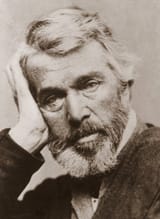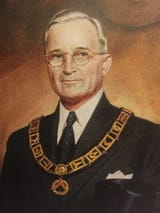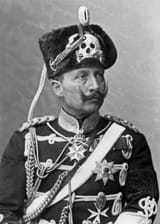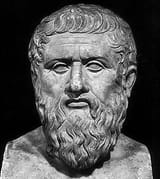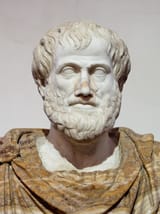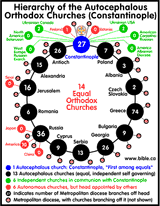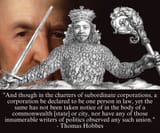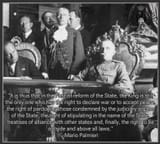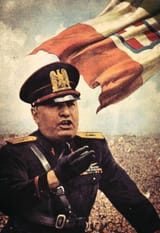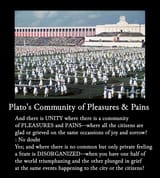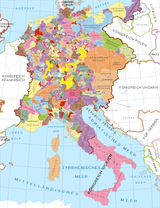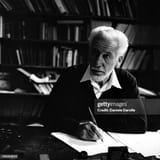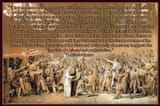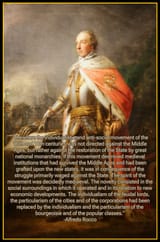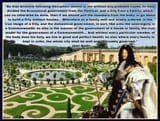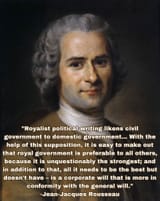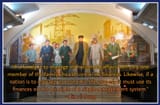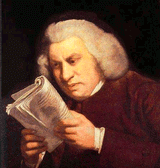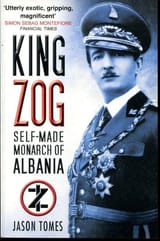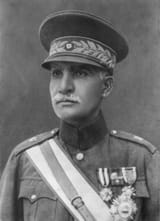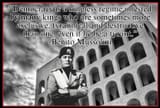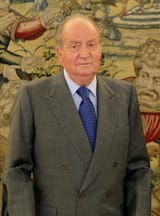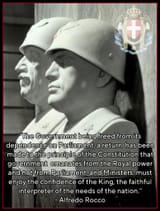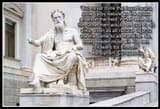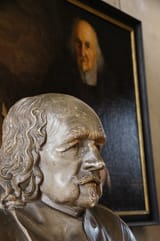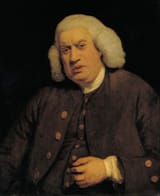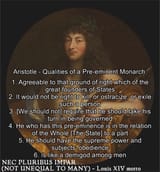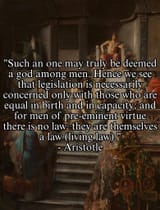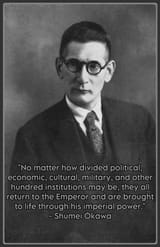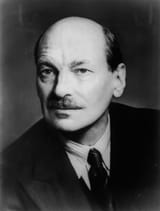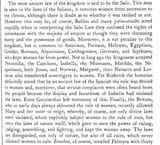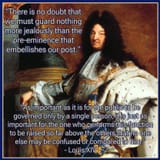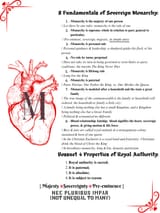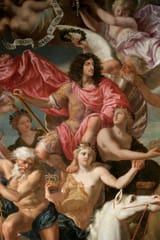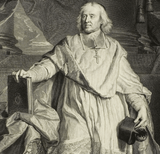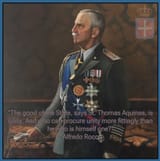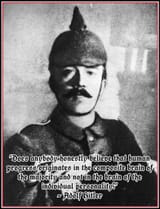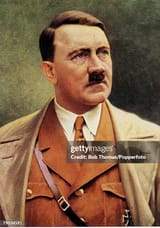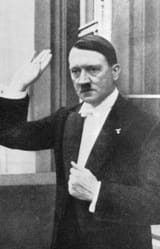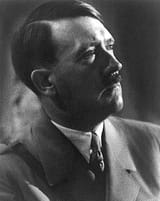Fascist literature?
I’m wanting to read more into fascism and it’s philosophical and political inspirations as of late both for myself as a fascist and as a means to better describe or show people the intellectual tradition it stems from.
I’ve read most of the boilerplate literature (Doctrine of Fascism, Mosley’s 100 Questions for Fascism and other assorted works, some Falangist works, schizoposts from when IronMarch still existed etc.) as well as some of the thinkers that inspired them such as Hobbes with the concept of the state, legitimacy and the sovereign as well as Nietzsche and his concept of Will to Power and to strive for strength and abhor weakness.
Is there anything else you guys would recommend I should read next or what thinkers I should look into, be it from the fascist tradition or from thinkers that predated it.
Anonymous
10/4/2025, 11:45:15 AM
No.24772126
>>24772181
>>24779634
>>24772108 (OP)
I feel that unfortunately fascism is less of a written doctrine than Communism is for example, with tons of theory and different theorists that argue with one another about the core tenets of the doctrine. When I wanted to become a well-read nationalist I went down the path you've already been down, Giovanni Gentile and Mosley and that is basically the core of the fascist writing specifically on fascism. There is a good NatSoc chart I've got saved but have yet to read any works from it. I am interested in the works of Jonathan Bowden as I am British, and think he was a great orator, I don't yet know if he is a great writer. When I get home I'll post the NatSoc chart if you haven't found it already.
Anonymous
10/4/2025, 11:45:49 AM
No.24772127
>>24772184
>>24772108 (OP)
Reflections of Violence by Sorel.
The Program of the Party of Hitler by Feder.
Wagner's political essays, there is a collection called "Richard Wagner on Tragedy, Christianity, and the State" which is good.
Read Schmitt if you haven't already.
Anonymous
10/4/2025, 12:18:07 PM
No.24772170
>>24772108 (OP)
I am currently reading Imperium by Francis Parker Yockey. Only read 200 pages until now, where he describes the historical and political outlook. So I can't really give a full review. But its difficult to label him as a fascist, because he mixes many elements of various schools. May be still worth a read.
Anonymous
10/4/2025, 12:26:35 PM
No.24772181
>>24772387
>>24772126
Interesting, if you’re still reading this thread could you post that chart by any chance? I am not a zbrit but am from a commonwealth country and though we didn’t have as strong of a fascist movement, the BUF did catch on her in some form or another before Natsoc took its place
Anonymous
10/4/2025, 12:28:06 PM
No.24772184
>>24772127
I’ve heard good things about Sorel and even Proudhon to some degree (mainly as it pertains to political violence and corporatism. I’ll give these authours a look thank you
>>24772108 (OP)
Avoid all repulsive Americanism. Avoid all disgusting neo-Nazism. Avoid all "white nationalism".
Writers from the 19th and 20th centuries are good! Lots of great literary figures... Celine, Pound, Hamsun, Rochelle, Rebatet, Brasillach, W. Lewis, Yeats, Schmitt, etcetera!
All kinds of iconoclasts and firebrands... romantics... sodomites... swashbucklers...
Anonymous
10/4/2025, 12:39:15 PM
No.24772208
>>24783540
>>24785462
>>24772198
Yeah I find the American writers(with the Exception of Ezra Pound) missed the mark on what their respective movements ought to be about as well as the methods for attaining it. That being said I don’t mind Rockwell but a lot of the people who came after (James Mason and siegetards in particular) fell short in my opinion at least intellectually as those movements rapidly degenerated into petty cliques and wanton violence without real strategy behind it.
Some of the names you me tiomed I’ve never read before, I’ll have to go read up on them
Anonymous
10/4/2025, 12:40:14 PM
No.24772210
Anonymous
10/4/2025, 1:10:56 PM
No.24772237
>>24776879
You are not a veteran from the Great war living in the ruins of the European civilization you were born and grew up in, and larping as one is cringe.
Maybe read the reactionaries so you don't come off as a conrarian philistine
Anonymous
10/4/2025, 1:28:04 PM
No.24772251
Anonymous
10/4/2025, 2:45:30 PM
No.24772368
Savitri was a fun read
>Which book
Yes
Anonymous
10/4/2025, 2:50:22 PM
No.24772374
>>24772894
You're calling yourself a Fascist before even understanding its foundation?
>>24772181
>if you’re still reading this thread could you post that chart by any chance?
Ofc mate.
How THE FUCK both fascists and commies NEVER read Giovanni Gentile, the father of fascism, the fucking marx of fascism, the Hegelian Gentile.
Anonymous
10/4/2025, 5:51:16 PM
No.24772726
>>24772736
>>24772636
>father of fascism
meme
Anonymous
10/4/2025, 5:58:31 PM
No.24772736
>>24772726
Fuck you commie or fashie
Anonymous
10/4/2025, 6:34:37 PM
No.24772818
>>24776518
>>24772636
Because Anglo race-ideology is rooted in vulgar materialism and fundamentally incompatable with Gentile's actual idealism. The only party which even comes close to realizing fascism in the Western world is the Liberal Party of Canada, which is not something any tradpol larper wants to recon with.
Anonymous
10/4/2025, 7:02:44 PM
No.24772859
>>24772861
>>24772198
>Lots of great literary figures... Celine
kek you have no idea what you're talking about.
Anonymous
10/4/2025, 7:03:38 PM
No.24772861
>>24772859
What's the problem? I fucking hate you. Fuck you.
Anonymous
10/4/2025, 7:21:05 PM
No.24772894
>>24774020
>>24772374
Communists do this every single day.
Anonymous
10/4/2025, 7:28:53 PM
No.24772908
>>24772108 (OP)
Read any books with facts in them, like the FBI Uniform Crime Report, and maybe even basic economics books
Anonymous
10/4/2025, 9:48:34 PM
No.24773245
>>24772387
Actually a fairly good list, I'll try and annotate it for what each branch leads you down later
Anonymous
10/4/2025, 10:09:59 PM
No.24773310
>>24772108 (OP)
Let's hear it from the inventor of the 'Aryan race' as an ethnologic term itself.
'Finally, perpetually preoccupied with his personality and what relates to it in a direct way, he [the Aryan] is not materially patriotic, and does not feel a passion for the sky, the soil, the place where he was born. He attaches himself to the people he has always known, and does so with love and fidelity; but not to things, and he changes province and climate without difficulty. This is one of the keys to the chivalrous character in the Middle Ages and the reason for the indifference with which the Anglo-Saxon of America, while loving his country, easily leaves his native land, and, likewise, sells or exchanges the land he received from his father.
Indifferent to the genius of the place, the Arian-German is also indifferent to nationalities, and only loves or hates them according to the relationships that these inevitable environments maintain with his own person.'
Anonymous
10/4/2025, 11:13:46 PM
No.24773444
>>24772636
OP here, are you retarded? I mentioned that I’ve read Gentile already
Anonymous
10/5/2025, 4:30:52 AM
No.24774020
>>24772894
This.
>what's dialectical materialism
>uh, well, all things are material, and they are related to each other, and that causes them to change
Anonymous
10/5/2025, 4:32:59 AM
No.24774023
>>24772636
FP here, I acknowledged OP's mention of his works and mentioned Gentile explicitly in my post.
Anonymous
10/5/2025, 5:30:41 AM
No.24774109
>>24775387
>>24772108 (OP)
The first book you should read is called Mussolini's intellectuals. That should give you a framework.
Also as fascism spawned from the 19-20th century leftist movements, its as varied and divided as the left is. National socialists and phalangists are as different as bolsheviks to anarcho syndicalists.
Anonymous
10/5/2025, 5:45:04 AM
No.24774135
>>24772108 (OP)
"The Damp and the Dry: A Brief Incursion into Fascist Territory" by Jonathan Littell is a short essay that gives you an insight of the fascist mindframe.
Anonymous
10/5/2025, 6:22:57 AM
No.24774216
>>24772108 (OP)
For My Legionaries - Corneliu Zelea Codreanu
I enjoyed it.
>All peoples around us have come from somewhere else settling on the land on which they now live. History gives us precise dates regarding the arrival of Bulgarians, Turks, Magyars, etc. Only one people came from nowhere: ours. We were born in the mist of time on this land together with the oaks and fir trees. We are bound to it not only by the bread and existence it furnishes us as we toil on it, but also by all the bones of our ancestors who sleep in its ground. All our parents are here. All our memories, all our warlike glory, all our history here, in this land lies buried.
Anonymous
10/5/2025, 8:09:51 PM
No.24775387
>>24775421
>>24774109
It's interesting to note that despite the variety in fascism, they were able to cooperate relatively well (barring the suppression of the NatSoc left, ofc), while the left will kill each other over even the slightest theoretical difference.
Anonymous
10/5/2025, 8:24:47 PM
No.24775421
>>24775387
I feel like Marx and Marxism ended leftist cooperation for good. His attitude that his theory is the best ever and his polemics alienated him from all the leftists. Proudhonists and Blanquists before him collaborated for the First International and the Paris Commune.
Anonymous
10/5/2025, 9:23:02 PM
No.24775564
>>24772636
political ideologues don't read, and when they do, it's a pathetic cursory reading beneath a chatgpt summary
Anonymous
10/5/2025, 9:42:15 PM
No.24775613
>>24775672
>>24782854
>>24772387
>Over half the chart is Hitler and Hitler-adjacent
So fascism really is just "that thing the Nazis did" and has no underlying philosophy? Imagine a Tankie Reading List that's entirely memoirs of Stalin and people who knew him and doesn't even include the Manifesto.
Anonymous
10/5/2025, 9:49:03 PM
No.24775630
Anonymous
10/5/2025, 10:01:48 PM
No.24775672
>>24776533
>>24776879
>>24775613
In the current culture it's defined by opposition to it by brainwashed kids so it's "bad stuff except when we do it".
I'm actually pretty liberal but obviously the word and symbol is the fasces, that's supposed to convey the core idea in symbolism. Any other specifics are means to the end of strength through unity, in the sense of the nation or in the case of Italy the greater empire, mirroring Rome.
>>24772108 (OP)
Fascism is a gay ideology for loser men who are incapable of crafting their own destiny or pursuing their own desires so they fall back into a gay herd mentality to feel a modicum of power. Unironically roasties are correct about fascists.
The worst part is that fascist enforcers are generally the primary victims of fascist violence. The SS was the Nazi unit with the most casualties. They're architects of their own failures
Anonymous
10/5/2025, 10:11:04 PM
No.24775696
>>24775774
>>24775677
This theory, this model of the world and lack of theory of mind lead Marxists in Germany to state sanctioned rape of young boys to cure of them of le fascism.
Anonymous
10/5/2025, 10:42:50 PM
No.24775774
>>24775696
kentler conducted his experiments in west berlin approved by the berlin senate, the government of west berlin.
Anonymous
10/6/2025, 12:09:22 AM
No.24775947
>>24772108 (OP)
Heidegger, Nietzsche, Spengler if you don't wanna just be a larp faggot but have a real justification for fascism.
Anonymous
10/6/2025, 12:40:09 AM
No.24776010
>>24776070
>>24779248
As a fascist you don’t need to read just follow some leader religiously and don’t question anything about him and be ready to do unspeakable crimes for him. That’s literally it. No need for study
Anonymous
10/6/2025, 1:10:33 AM
No.24776070
>>24776836
>>24776010
This is the average university communist's understanding of fascism. Absolutely pathetic and childish.
Anonymous
10/6/2025, 1:20:40 AM
No.24776092
>>24776484
>>24776529
>>24775677
Fascism is nothing but conservatism for the modern world. (Zizek's words not mine)
Back then we had kings and nobles and a heirarchy based social order. Fascists try to bring that back but within a capitalist corpo framework for industries. With enough populism and fear mongering sprinkled in to prevent a revolution.
Of course they can't have outright social classes nowadays so they pretend everyone is equal but you must never compromise on loyalty to the system. But the system has elites. Instead of shooting you for disobeying your feudal lord they'll shoot you for disobeying the "nation". A "nation" that somehow always has feudal lord adjacents, with their position justified by some faustian myth or another
>>24776092
So Obama was a fascist?
Anonymous
10/6/2025, 5:50:37 AM
No.24776492
>>24776501
>>24772108 (OP)
Fascists don't read. there are less than 1,000 well read roman statue looking brownshirts alive today and the un/fit/ ones are all here.
Anonymous
10/6/2025, 5:53:51 AM
No.24776501
>>24776510
>>24776492
It's odd how individuals who detest fascism regularly subject fascists to purity tests.
Anonymous
10/6/2025, 6:01:42 AM
No.24776510
>>24776501
I never said they don't exist, just that they don't read. Laser eye PFP's aren't quoting Maurice Bardèche
Anonymous
10/6/2025, 6:09:29 AM
No.24776518
>>24782756
Anonymous
10/6/2025, 6:10:38 AM
No.24776520
Anonymous
10/6/2025, 6:12:43 AM
No.24776526
>>24776484
If only you knew
Anonymous
10/6/2025, 6:15:13 AM
No.24776529
>>24776789
>>24776092
So true. I'm glad that Communism wasn't a similar dress-up for feudalism with elites. That would be extremely embarrassing for our deeply held beliefs.
Anonymous
10/6/2025, 6:17:15 AM
No.24776533
>>24776758
>>24775672
How is that different from nationalism and how do you reconcile the ethnocentrism aspect with the idea of national unity in a multicultural empire that in its heyday spanned practically the entirety of the known world?
>>24776533
You don't need ethnocentrism or nationalism, depending on the situation they can be means to foster unity or cause division. Romans thought in terms of dynasties so being half black or something would be a prestige debuff but you're still part of the dynasty.
The Greeks who had a lot of experience with multiculturalism tended towards the idea that diversity leads to tyranny and was usually encouraged by people with tyrannical ambitions. The Roman republic has similar ideas and the idea was basically proven wrong by the process that destroyed the republic and put power in the hands of one man.
Anonymous
10/6/2025, 8:07:32 AM
No.24776762
>>24776758
>the idea was basically proven wrong
*proven correct
CFUX-FM
10/6/2025, 8:16:51 AM
No.24776778
>>24772198
I remember when being American meant being a bit jingoistic but still proud of beating the Nazis.
https://youtu.be/6-2F0x7tzcM
Anonymous
10/6/2025, 8:19:58 AM
No.24776789
>>24777425
>>24776484
Not quite. liberals do tend to gravitate in that direction. But fall short of the adherence to system part.
>>24776529
Communism is a different framework entirely of course. Classless society is its core tenet. It's the logic of democracy and people's franchise/control over their fate taken to it's natural conclusion
>>24776070
This is the truth, I‘m not a communist, I‘m a Kantian Liberal. Fascism is anti-intellectual, completely vibe-based, if you read history you will realise how the irrationality of the leaders lead to their country‘s ruin because they did not believe in logic and intellect. Just pure instinctual power.
Anonymous
10/6/2025, 9:29:56 AM
No.24776879
>>24775672
>I'm actually pretty liberal but obviously the word and symbol is the fasces, that's supposed to convey the core idea in symbolism. Any other specifics are means to the end of strength through unity, in the sense of the nation or in the case of Italy the greater empire, mirroring Rome.
I thought if the origin of the word for fascism was English rather than Italian it would be called something like "Unity-ism." (Of course Italian also has a different word for unity but it basically means that.)
>>24772237
>You are not a veteran from the Great war living in the ruins of the European civilization you were born and grew up in, and larping as one is cringe.
IMO on this "unity" theme, I think an actually effective nationalism would aim at uniting people who a lot of modern-day *rightists* don't actually like, so there's a situation where both religious-conservative and relatively liberal secular people are waving the same flag and considering themselves to be one the same team. It would look more like Ukraine or Israel which, well, probably indicates that having a big army and a lot of people serving in it is important:
https://youtu.be/5NdCJHPHL-8
https://youtu.be/ha-8LO0seaM
Anonymous
10/6/2025, 3:37:28 PM
No.24777425
>>24776789
>Communism is a different framework entirely of course. Classless society is its core tenet. It's the logic of democracy and people's franchise/control over their fate taken to it's natural conclusion
That natural conclusion being widespread misery, surely?
Anonymous
10/6/2025, 5:23:34 PM
No.24777604
>>24777686
Anonymous
10/6/2025, 5:48:43 PM
No.24777648
>>24777694
>>24778867
>>24776758
If fascism doesn't require the things Hitler did, why is the fascist reading list little more than a study of Hitler's life? What books should one read to learn about real fascism?
Anonymous
10/6/2025, 6:08:57 PM
No.24777686
>>24777604
Along with George Washington! The ultimate proto-Fascist!!!!!
Anonymous
10/6/2025, 6:12:00 PM
No.24777694
>>24777648
Read those who have studied Fascism extensively. Roger Griffin, A. James Gregor, Aristotle Kallis.
I can see the appeal of Fascism but it's really just an ersatz Monarchism. Monarchy is so much more superior and the most natural form of government. Fascists also destroyed a number of European Monarchies. They can't be forgiven for that. Monarchy is the way.
Anonymous
10/7/2025, 1:45:44 AM
No.24778670
>>24772108 (OP)
grow up, faggot. this is so boring.
Anonymous
10/7/2025, 3:33:04 AM
No.24778867
>>24785789
>>24777648
Obviously when Mussolini started it wouldn't have been about Hitler so something changed. The word "fascism" almost only being used as a slur that associates you with Hitler means those who identify as "fascist" will tend to buy into those "anti-fascist" narratives to some degree. It's like the meme where society keeps saying "you are the bad guy" ending with the kids saying "i am the bad guy".
The only distinct thing about the early fascists seems to be the idea of prioritizing unity and trying to figure out and use whatever secret sauce fuelled the Romans. All the retarded lists of "signs of fascism" apply more to supposed liberals than anyone else.
Anonymous
10/7/2025, 5:23:12 AM
No.24779123
>>24772108 (OP)
Most transcendental literature is fascist literature.
Anonymous
10/7/2025, 6:23:36 AM
No.24779243
>>24775677
>be fascist
>pursue your own destiny and desires
>tranny retard in 4chan: Nooooooo, not like that, you have to fight for gay rights!
Anonymous
10/7/2025, 6:26:38 AM
No.24779248
>>24776010
This, but you forgot being based and redpilled while doing it.
Anonymous
10/7/2025, 6:28:26 AM
No.24779251
>>24776758
>and the idea was basically proven wrong
Are you bad in the head?
Anonymous
10/7/2025, 6:29:36 AM
No.24779253
>>24776836
I once more agree with the meme ideology fag.
Anonymous
10/7/2025, 6:30:39 AM
No.24779256
>>24777731
>Monarchy is the way
If you are a cuck.
Anonymous
10/7/2025, 12:21:29 PM
No.24779634
>>24772126
It's because fascism is a late capitalist historical phenomenon rather than a monolithic ideology
Anonymous
10/7/2025, 9:32:22 PM
No.24780897
Anonymous
10/7/2025, 9:58:07 PM
No.24780954
>>24780955
Anonymous
10/7/2025, 9:58:43 PM
No.24780955
>>24780958
Anonymous
10/7/2025, 9:59:20 PM
No.24780958
>>24780961
Anonymous
10/7/2025, 9:59:57 PM
No.24780961
Anonymous
10/8/2025, 5:22:08 AM
No.24781965
>>24782769
>>24776836
>fascism is anti-intellectual, completely vibe-based
>>24776836
>Just pure instinctual power.
Yes, that's how the world works. Everyone in power knows it, not just fascists.
Anonymous
10/8/2025, 5:30:20 AM
No.24781984
>>24776484
Yes, America has been fascist since its inception, it's literally a Freemasonic experiment on melding together state and industry in the hands of the elite.
Anonymous
10/8/2025, 6:57:43 AM
No.24782142
A Handbook for Traditional Living, I don't know if it counts.
Anonymous
10/8/2025, 6:59:37 AM
No.24782144
>>24784598
>>24777731
Absolute Monarchy or Parliamentary Monarchy?
Anonymous
10/8/2025, 3:51:42 PM
No.24782756
>>24782893
>>24785789
>>24776518
The core principle of Fascist ideology is the bringing together of the nation under a single ideological framework which is itself directed by the State. This doesn't sound like much, but fascism has roots in philosophical idealism so theres the idea that perception creates reality and by having the Party or the State as hegemonic over mediating perception the State is able to mediate reality itself.
The Liberal Party is the only political party I can think of which has fully mobilized civil culture as a tool for realizing national objectives. Every ideological relic of "what it means to be Canadian" was at some point cooked up by a cabal of liberal party beaurocrats and dissiminated through joint State-Private media partenerships. The economy, and this is really evident under Mark Carney, is not really free market but a party elite picking out corporations to get state support in pursuit of a concept of national greatness. Our immigration policies espescially betray the view of the government towards people as a sort of innate organic matter to be directed by the State/Party Elites towards the best interests of the State.
The Liberal Party lacks that Latin flair of previous fascisms, but I don't think there's another democracy on earth which seeks to consolidate financial, state, and cultural power under a party elite which defines the nation in a strictly top-down and inorganic way to the same extent that Canada does. Not a western democracy anyways, maybe North Korea or Eritrea.
Anonymous
10/8/2025, 3:57:08 PM
No.24782769
>>24782780
>>24782899
>>24781965
>>Just pure instinctual power.
>Yes, that's how the world works. Everyone in power knows it, not just fascists.
This is such lazy thinking dressed up as profundity. Imagine it's winter and you're trying to build a cabin to stay warm. Someone comes up and smugly says, 'Heheh, you fool, why kid yourself? Don't you know winter is inherently cold?' That's how it feels whenever someone pulls the 'well life isn't fair' routine.
Anonymous
10/8/2025, 4:04:06 PM
No.24782780
>>24782769
I think it's something in the algorithm these days, so many young people are adopting a smug cynicism rooted not in life experience (as previous cynicisms at least pretended to be) but in doom scrolling.
Anonymous
10/8/2025, 4:36:59 PM
No.24782854
>>24775613
That's because it's a National Socialist reading list, not a Fascist one. Pretty distinct but they just got lumped together due to commies wanting to pretend they were going to be the winners over capitalism. So Fascism got big in Italy -> it's just capitalism. National Socialism got big in Germany -> It's just Fascism. And since then historians took that over and have been trying and failing to justify that position with their "generic fascism". Even for a National Socialist reading list it's pretty heavily outdated since it's from mid to late 2010's. It doesn't include many old important works, books about the pre-Hitler period, many of the early inspirations for Hitlers additions to the ideology and of course misses new good books.
Anonymous
10/8/2025, 4:53:07 PM
No.24782893
>>24785972
>>24782756
Interesting theory anon. I suppose they really do come the closest to approximating what fascists actually wanted to achieve via the state while promoting values completely at odds with those of every fascist ever. Canadians also have this sort of weird civic nationalism drilled into them by their civic institutions and media that's completely unmoored from race or ethnicity (source: I grew up there). ofc it should be noted that "fascist" and "national socialist" are not synonymous
Anonymous
10/8/2025, 4:58:54 PM
No.24782899
>>24782769
I'm not saying that at all. I'm saying that the same amount of power the cold has has to be exerted in order to heat yourself.
Anonymous
10/8/2025, 9:09:25 PM
No.24783520
>>24772108 (OP)
Pretty sure Antelope Hill Publishing released a collection of Mussolini speeches and a short work called "With D'Annunzio in Fiume". There are two essays by Charles Maurras "The Future of the Intelligentsia & For a French Awakening" available. It's nothing too special but he was an important pre-fascist, though most of his work is untranslated.
Anonymous
10/8/2025, 9:16:29 PM
No.24783540
>>24772208
Even Rockwell fell short though. He essentially removed nearly all of the economic aspects of National Socialism from neo-Nazism since he saw it as too socialist for Americans to accept, This led to it being boiled down to not being too different from a generic racist/identitarian ideology, and invited the more boorish crowd associated with that. Even nowadays most people don't know much more besides what Feder wrote.
Anonymous
10/8/2025, 9:22:18 PM
No.24783551
>>24783568
>There is a great deal of confusion in studying Hitler's family tree. Much of this is due to the fact that the name has been spelled in various ways: Hitler, Hidler, Hiedler, and Huettler. It seems reasonable to suppose, however, that it is fundamentally the same name spelled in various ways by different members of what was basically an illiterate peasant family. Adolf Hitler himself signed his name Hittler on the first Party membership blanks, and his sister usually spells her name as Hiedler. Another element of confusion is introduced by the fact that Adolf's mother's mother was also named Hitler, which later became the family name of his father. Some of this confusion is dissipated, however, when we realize that Adolf's parents had a common ancestor (father's grandfather and mother's great-grandfather), an inhabitant of the culturally backward Waldviertel district of Austria.
>Adolf's father, Alois Hitler, was the illegitimate son of Maria Anna Schicklgruber. It is generally supposed that the father of Alois Hitler was a Johann Georg Hiedler, a miller's assistant. Alois, however, was not legitimized, and he bore his mother's name until he was forty years of age when he changed it to Hitler. Just why this was done is not clear, but it is generally said among the villagers that it was necessary in order to obtain a legacy. Where the legacy came from is unknown. One could suppose that Johann Georg Hiedler relented on his deathbed and left an inheritance to his illegitimate son together with his name. It seems strange, however, that he did not legitimize the son when he married Anna Schicklgruber thirty-five years earlier. Why the son chose to take the name Hitler instead of Hiedler, if this is the case, is also a mystery that has remained unsolved. Unfortunately, the date of the death of Hiedler has not been established, and consequently we are unable to relate these two events in time. A peculiar series of events, prior to Hitler's birth, furnishes plenty of food for speculation.
1/?
Anonymous
10/8/2025, 9:27:30 PM
No.24783568
>>24783551
>There are some people who seriously doubt that Johann Georg Hiedler was the father of Alois. Thyssen and Koehler, for example, claim that Chancellor Dollfuss had ordered the Austrian police to conduct a thorough investigation into the Hitler family. As a result of this investigation a secret document was prepared that proved that Maria Anna Schicklgruber was living in Vienna at the time she conceived. At that time she was employed as a servant in the home of Baron Rothschild. As soon as the family discovered her pregnancy she was sent back to her home in Spital where Alois was born. If it is true that one of the Rothschilds is the real father of Alois Hitler, it would make Adolf a quarter Jew. According to these sources, Adolf Hitler knew of the existence of this document and the incriminating evidence it contained. In order to obtain it he precipitated events in Austria and initiated the assassination of Dollfuss. According to this story, he failed to obtain the document at that time since Dollfuss had secreted it and had told Schuschnigg of its whereabouts so that in the event of his death the independence of Austria would remain assured. Several stories of this general character are in circulation.
> Those who lend credence to this story point out several factors that seem to favor its plausibility.
>1. That it is unlikely that the miller's assistant in a small village in this district would have very much to leave in the form of a legacy.
>2. That it is strange that Johann Hiedler should not claim the boy until thirty-five years after he had married the mother and the mother had died.
>3. That if the legacy were left by Hiedler on the condition that Alois take his name, it would not have been possible for him to change it to Hitler.
>4. That the intelligence and behavior of Alois, as well as that of his two sons, is completely out of keeping with that usually found in Austrian peasant families. They point out that their ambitiousness and extraordinary political intuition are much more in harmony with the Rothschild tradition.
>5. That Alois Schicklgruber left his home village at an early age to seek his fortune in Vienna where his mother had worked.
>6. That it would be peculiar for Alois Hitler, while working as a customs official in Braunau, to choose a Jew named Print, of Vienna, to act as Adolf's godfather unless he felt some kinship with the Jews himself.
It's interesting to me that the Pentagram website wikipedia ignores this detail about "Hitler's" genealogy and instead points exclusively to a debunked theory.
>Nazi Hans Frank suggested that Alois's mother had been employed as a housekeeper by a Jewish family in Graz, & 19-year-old son Leopold Frankenberger had fathered Alois, a claim that called the Frankenberger thesis
Anonymous
10/8/2025, 10:37:40 PM
No.24783720
>>24783846
Fascism no longer exists in its original form. Capital no longer wants or needs a singular strongman to guarantee endless return on investment. They have been able to expropriate and privatize more or less whatever they want from the commons for decades.
Most contemporary self-indentified 'fascists' are lone individuals looking for some kind of transgressive persona in order to scrape some kind of autonomy in a world that affords them less and less.
Anonymous
10/8/2025, 11:22:54 PM
No.24783846
>>24783720
"Fascism" is the name of a dog that the Freemasons brought up.
Anonymous
10/9/2025, 4:38:45 AM
No.24784598
>>24784626
>>24782144
Parliamentary, there has to be some form of checks but not the nonsense we have today in Europe for example where it's mostly ceremonial. I'm talking about a true constitutional monarchy.
Anonymous
10/9/2025, 4:55:17 AM
No.24784626
>>24785323
>>24784598
>true constitutional monarchy.
As all the rest and anytime other "true constitutional monarchies" are tried, they turn to shit on wheels.
The only ONLY alternative is for communities to take charge of themselves. Welcome the responsibility.
Anonymous
10/9/2025, 11:16:18 AM
No.24785256
>>24772387
Why is Orwell, a self proclaimed democratic-socialist and anti-fascist, on this list?
Anonymous
10/9/2025, 12:04:45 PM
No.24785323
>>24789767
>>24784626
We just have different ways of viewing things. What you call responsibility is being led by the herd. Democracy. Mob rule. The mirage of equality. One man one vote no matter the intellect, education or rationality of the man. No thank you.
Monarchy has preserved individual rights and has prevented tyrannical leaders more effectively than democracy on average.
Anonymous
10/9/2025, 12:31:17 PM
No.24785370
>>24785504
>>24787535
>>24777731
Kaiser Wilhelm II on Hitler:
>There is a man alone, without family, without children, without God... He builds legions but he doesn’t build a nation. A nation is created by families, a religion, tradition: it is made up out of the hearts of mothers, the wisdom of fathers, the joy and the exuberance of children. [Hitler's Germany would be]... an all-swallowing State, disdainful of human dignities and the ancient structure of our race, sets itself up in place of everything else. And the man who, alone, incorporates in himself this whole State, has neither a God to honour nor a dynasty to conserve, nor a past to consult.
>For a few months I was inclined to believe in National Socialism. I thought of it as a necessary fever. And I was gratified to see that there were, associated with it for a time, some of the wisest and most outstanding Germans. But these, one by one, he has got rid of or even killed... This man could bring home victories to our people each year without bringing them glory... But of our Germany, which was a nation of poets and musicians and artists and soldiers, he has made a nation of hysterics and hermits, engulfed in a mob and led by a thousand liars or fanatics...
http://m.oldmagazinearticles.com/what_did_Kaiser_Wilhem_think_about_Hitler#google_vignette
off-topic but I have made a Plato reading server for anyone interested to join:
https://discord.gg/PXtbdq5j
Anonymous
10/9/2025, 1:27:11 PM
No.24785455
>i like power
>therefore i will make a doctrine about me getting to keep that power, and only me!
there is your literature bro
Anonymous
10/9/2025, 1:28:46 PM
No.24785462
>>24772208
Thats because American thought in of itself its not too conducive to it. Regardless, a lot of the stuff i ingested years ago has been wiped away with me engaging with Pragmatist thought and phenomenology which are worlds away from Fascism. Thats not to say I have abandoned all precepts of it.
Anonymous
10/9/2025, 1:39:05 PM
No.24785477
>>24772108 (OP)
this one is good
Anonymous
10/9/2025, 1:58:23 PM
No.24785504
>>24785370
My God how spot on he was! Thank you for this post.
Anonymous
10/9/2025, 4:50:29 PM
No.24785789
>>24785972
>>24782756
>Every ideological relic of "what it means to be Canadian" was at some point cooked up by a cabal of liberal party beaurocrats and dissiminated through joint State-Private media partenerships.
I'm not from Canada (been there a few times) and the way the Liberal Party taps into nationalism better than the Tories is an interesting thing to me:
https://youtu.be/jKQPw9vmG04
>>24778867
>The only distinct thing about the early fascists seems to be the idea of prioritizing unity and trying to figure out and use whatever secret sauce fuelled the Romans. All the retarded lists of "signs of fascism" apply more to supposed liberals than anyone else.
Zeev Sternhell wrote some books that treated it as a distinct ideology that fused together revolutionary concepts from the left with anti-Enlightenment concepts from the right. The story of its evolution in Italy was from revolutionary-minded types (often attracted to revolutionary syndicalism) who sought to overcome turn-of-the-century cultural decadence and saw class warfare by the proletariat as the means to do that. Sorel's theories about mobilizing myths and passions was influential (because the proletariat is too easily bought off by corrupt liberal parliaments and reform-minded labor parties), and this is also where the anti-Enlightenment stuff comes in because the Enlightenment was rooted in concepts like reason, science, and progress (Marxism identified with this tradition as did liberalism) compared to the intangible values like heroism which the emerging fascists based their ethic in.
You see this anti-Enlightenment stuff on the right today if you know where to look. Like, nostalgia for the Middle Ages and a feeling that there's more to life than just working some normie job. It's like romantic chivalry and heroism. Well, these ideas were super-charged by World War I, while the newly-minted fascists (who started as a pro-war "angry patriots" veterans club) dropped the class warfare stuff for nationalism. Like these former syndicalists started talking about "Italian workers" instead of "workers" and then dropped that for just "Italy." And this also linked up with the bigger anti-communist movement on the right since there was a revolution in Russia and labor unrest in many countries after the war.
But the military side of things doesn't get stated enough IMO. There was just a huge number of men who had been through trench warfare, and could in theory practice that inside their own countries. Ukraine today is like this but most Americans for example don't serve in the army, it's a relatively small percentage of the population. Israel has a lot of men serve in the army, something like 1/20 Israelis went off to war in the past two years:
https://youtu.be/cjL0VI2UmMY
Anonymous
10/9/2025, 6:07:06 PM
No.24785972
>>24782893
There's a reason that Canada produces so many conservative/far right commentators. We never really went through a period of modernization analogous to what most of the world experienced, and a lot of our institutions are essentially feudal in nature. I dont know if, like that other anon claimed, this leads naturally to fascism as a form of neo-feudalism, but it definitely effects how Canadians experience the world, ethnicity, and politics.
My biggest gripe with the Liberal party is that they don't go far enough. Or better, Canada is so rife with corruption on all levels of government that it is very hard to achieve the kinds of nation-building projects that are really needed.
>>24785789
Canada truly is a post-national state insomuch as very few people think of themselves as Canadian purely. The Liberal party in paticular has had several hundred years of experience running the country as a minority ethnic group (white Anglo-Saxons after all were never a majority in Canada), so we naturally tend towards a sort of liberal cosmopolitanism that doesn't seek to define things like culture, language, even our history as central to the Canadian ontology. The Liberals understand this and focus their policies towards generally technocratic projects while defining Canadian identity as vague "being a good person" and "not being American". Conservatives really understood this under Harper, but they tend to cozy up too close to the US which many people take as a betrayal of Canadian identity (wrongly I would say, lots of policies that America persues are supperior to Canada, especially in regard to having free markets and antitrust busting).
The issue is that this multi-ethnic liberalism only works as long as all ethnicities are adhering to an unspoken set of norms and rules, a national character if you will. With the introduction of many Indians, I think Canada is going to find that the caste system is uniquely suited to our multicultural pluralistic society, and as it becomes entrenched it will bring along all the problems of ethnic resentment, corrupton, and stagnation that it causes in the East. I don't think any theorist has tackled the problem of self-serving minority groups taking over parts of the government or economy (not since the holocaust anyways), but we will probably end up either adopting Singaporean style racial quotas targeted at destroying the strength and cohesion of ethnic minority groups OR we are going to see the Canadian economy and body politic increasingly fragmented along specific ethnic lines, with a handful of large clans battling in a zero-sum enviroment for control over the government purse. I can already see the Sikh community working in this direction. Ultimately I think Canada will be forced to define itself as a national body in order to articulate a concept of the common good, but it will be a hard transition and require a serious reorientation of Canadian values on topics like racism and minority rights.
Anonymous
10/9/2025, 10:10:08 PM
No.24786670
>>24772636
Most Fascists are drawn to esotericism, painfully ironic, agreeing with Evola's condemnation of Fascism's immanentism for his transcendentalism: This cannot be done without overlooking much of what makes Fascism well Fascism, but most fake Fascists are blind.
Anonymous
10/9/2025, 10:17:21 PM
No.24786690
OP, I recommend reading Mario Palmieri and Alfredo Rocco.
Importantly, yes, read Giovanni Genitle's Doctrine of Fascism and Mussolini Doctrine on Fascism and his speeches. Read Mussolini's speeches:
https://bibliotecafascista.blogspot.com/p/speeches.html
Giuseppe Bottai is also a good read for understanding Fascism.
I talk at length about State Corporatism in this thread:
>>24783826
It's important to understand State Corporatism for what it truly is, because many people have a misconception of what State Corporatism is (thinking private corporations and not the State itself as a unitary mode of politic and one corporate body of the State, like Hobbes' Leviathan or as espoused in Plato's Republic).
>>24777731
I disagree.
I think Monarchists could learn a thing or two from Fascists: Monarchists should be looking into State Corporatism and admiring a Unitary mode of Politics. Monarchists have been psyoped into thinking of Monarchy on Aristotle's terms only and in terms of decentralization and abandoned the unitary framework of Monarchical rule for mixed constitutionalism.
Fascism and other State Corporatist ideologies, to the contrary, are laying the groundwork for future monarchies: they might not have a Christian crown, but these secular dictators are your modern monarchies in a way.
Anonymous
10/9/2025, 10:21:52 PM
No.24786704
Anonymous
10/9/2025, 10:24:35 PM
No.24786714
Anonymous
10/9/2025, 10:26:27 PM
No.24786727
Let me explain what State Corporatism is.
Not many people understand what State Corporatism truly means, thinking "merge of State and Corporate power" means an assembly of private corporations--this is untrue, the Corporation that Fascism talks about is none other than Leviathan, the State as One Corporate Person, with the subordinate corporations relying upon its unitary soul / cult of personality.
What is State Corporatism?
>State Corporatism is a unitary politics with the State as One Personhood, a living organism, a higher personality and being; not to be confused with a collection of private corporations (which is reminiscent of Aristotle's partnership of clans / concordant body of hosts / friendship of hosts / concord of clans / multi-parties).
Anonymous
10/9/2025, 10:32:35 PM
No.24786755
TO start, I recommend Plato's Republic, book 5 -- to understand State Corporatism -- regardless of whether we take Plato at face value, what is being expounded upon here is State Corporatism.
Plato Republic's State Corporatism:
>And the city whose state is most like that of an individual man.
>“The same,” he said, “and, to return to your question, the best governed state most nearly resembles such an organism.”
>But we further agreed that this unity is the greatest blessing for a state, and we compared a well governed state to the human body in its relation to the pleasure and pain of its parts.”
Plato is for a unitary mode of politics (quite unlike Aristotle, who advocates a view of a State as a plurality).
Plato Republic:
>That the other citizens too must be sent to the task for which their natures were fitted, one man to one work, in order that each of them fulfilling his own function may be not many men, but one, and so the entire city may come to be not a multiplicity but a unity.
...
>so the entire city may come to be not a multiplicity but a unity.
Plato Republic:
>For factions… are the outcome of injustice, and hatreds and internecine conflicts, but justice brings oneness of mind and love.
Plato Laws:
>That all men are, so far as possible, unanimous in the praise and blame they bestow, rejoicing and grieving at the same things, and that they honor with all their heart those laws which render the State as unified as possible
Plato sets the foundation for Unitary politics in the lineage of political philosophy.
Anonymous
10/9/2025, 10:36:45 PM
No.24786770
Aristotle is more for political pluralism (NOT to be confused for individualism, but that the State is a plural body, shared between a partnership of clans / a friendship of hosts, think Orthodox Church hierarchy where the bishops are self-governing without a Pope or Unilateral authority -- think Holy Roman Empire or Malaysia's High King or United Arab Emirates).
By political pluralism, I mean the rule of the Estates-General as a partnership of clans (3 estates) or multi-parties as seen in multi-party democracies (multi-parties are in a way a modern variation of this partnership of clans / friendship of hosts).
Aristotle / Since the nature of a State is to be a plurality
>Further, as a means to the end which he ascribes to the State, the scheme, taken literally is impracticable, and how we are to interpret it is nowhere precisely stated. I am speaking of the premise from which the argument of Socrates proceeds, "That the greater the unity of the State the better." Is it not obvious that a state at length attain such a degree of unity as to be no longer a State? since the nature of a State is to be plurality, and in tending to greater unity, from being a State, it becomes a Family, and from being a Family, an Individual; for the Family may be said to be more than the State, and the Individual than the family. So that we ought not to attain this greatest unity even if we could, for it would be the destruction of the State. Again, a State is not made up only of so many men, but of different kinds of men.
...
Aristotle even criticizes Plato for atomization / individualism by trying to attain too much unity:
>since the nature of a State is to be plurality, and in tending to greater unity, from being a State, it becomes a Family, and from being a Family, an Individual; for the Family may be said to be more than the State, and the Individual than the family.
Anonymous
10/9/2025, 10:40:04 PM
No.24786776
Aristotle Politics / Anti-State Corporatism / Anti-Absolute Monarchy
>For the people becomes a monarch, and is many in one; and the many have the power in their hands, not as individuals, but collectively. Homer says that ‘it is not good to have a rule of many,’ but whether he means this corporate rule, or the rule of many individuals, is uncertain. At all events this sort of democracy, which is now a monarch and no longer under the control of law, seeks to exercise monarchical sway, and grows into a despot; the flatterer is held in honor; this sort of democracy being relatively to other democracies what tyranny is to other forms of monarchy. The spirit of both is the same, and they alike exercise a despotic rule over the better citizens.
Aristotle opposes the idea of "many in one" or the State as an individual -- that Plato lays down in Plato's Republic. Where Plato says the nature of the State ought to be Unitary, Aristotle says it ought to be a Plurality.
>"For the people becomes a monarch, and is many in one"
Aristotle says.
>"Whether [Homer] means this corporate rule"
>Seeks to exercise a monarchical sway
Anonymous
10/9/2025, 10:43:44 PM
No.24786788
Plato / There won't be any difference, so far as ruling is concerned, between the character of a great household & the bulk of a small city
>Visitor: Well then, surely there won't be any difference, so far as ruling is concerned, between the character of a great household, on the one hand, and the bulk of a small city on the other? – Young Socrates: None. – It's clear that there is one sort of expert knowledge concerned with all these things; whether someone gives this the name of kingship, or statesmanship, or household management, let's not pick any quarrel with him.
Aristotle writes in Politics,
>Now there is an erroneous opinion that a statesman, king, householder, and a master are the same, and that they differ, not in kind, but only in the number of their subjects. For example, the ruler over a few is called a master; over more, the manager of a household; over a still larger number, a statesman or king, as if there were no difference between a great household and a small state.
Aristotle:
>For some are of opinion that the rule of a master is a science, and that the management of a household, and the mastership of slaves, and the political and royal rule, as I was saying at the outset, are all the same
This distinction is very important: to make political / economical no different -- means to justify corporate rule over the political constitution.
But Aristotle views a political constitution, again, as a concord of freemen and equals & that political (city) and economical (household management / estate) don't have the same science or knowledge, but Plato acknowledges this... This is very important because Fascism and other one-party states do exactly that: through one-party regimes they make a corporate rule of the country through one party, so the country could act as one personality through one party organization.
Anonymous
10/9/2025, 10:49:54 PM
No.24786806
Aristotle:
>The rule of a household is a monarchy, for every house is under one head:
>whereas constitutional rule is a government of freemen and equals.
Aristotle makes a Monarchy proper as an economic unit only, and political / constitutional rule proper for a regime of freemen and equals.
Where Monarchy seeks pre-eminence over the notables, Aristotle denies -- his relationship is less unilateral and more concordant between the estates rather than a unitary body preceding and establishing these estates (like the soul before the body).
To see this principle of Aristotle in action, look at De Jouvenel's writing:
De Jouvenel / Monarchical vs Senatorial
>According to which of these two hypotheses is adopted, the conclusion is reached that the "natural" government is either the monarchical or the senatorial. But from the time that Locke utterly smashed up Filmer's fragile structure, the earliest political authority was considere to be the senate composed of fathers of families, using the word "families" in the widest sense.
>Society must, therefore, have presented two degrees of authority, which were quite different in kind. On the one hand is the head of the family, exercising the most imperious sway over all who were within the family circle.
>On the other are the heads of families in council, taking decisions in concert, tied to each other only by consent, submitting only to what has been determined in common, and assembling their retainers, who have outside themselves, neither law nor master, to execute their will.
Again, think Orthodox vs Catholic Church: In Catholicism, there's papal primacy, unilateral authority, central authority -- the Pope has preeminence over the bishops, and Catholicism acts like a corporate body -- but Orthodox considers the Pope one among equals, and is more council-like.
Thomas Hobbes writes
>The error concerning mixed government has proceeded from want of understanding of what is meant by this word body politic, and how it signifies not the concord, but the union of many men.
&
>The other error in this his first argument is that he says the members of every Commonwealth, as of a natural body, depend one of another. It is true they cohere together, but they depend only on the sovereign, which is the soul of the Commonwealth
&
>They who compare a City and its Citizens, with a man and his members, almost all say, that he who hath the supreme power in the City, is the relation to the whole City, such as the head is to the whole man. But it appears by what has been already said, that he who is endued with such a power (whether it be a man, or a Court) has a relation to the City, not as that of the head, but of the soul to the body. For it is the soul by which a man has a will, that is, can either will, or nill.
Anonymous
10/9/2025, 10:55:02 PM
No.24786825
To further understand the Aristotelian objection to this Unitary principle of Politics / State Corporatism, the student of Alexis de Tocqueville, -- De Jouvenel, is a good example again:
De Jouvenel - Republic of Old
>The republic of old had no state apparatus. It needed no machinery for imposing the public will on all the citizens, who would have had none of such a thing. The citizens, with their own wills and their own resources – these latter small at first but continuously growing – decide by adjusting their wills and execute by pooling their resources.
>We do not find anywhere in the ancient republic a directing will so armed with its own weapons that it can use force. There were the consults, I may be told. But to start with there were two of them, and it was an essential feature of the office that they could block one another's activities.
>Only those decisions were possible on which there was general agreement, and, in the absence of any state apparatus, their execution depended solely on the cooperation of the public. The army was but the people in arms, and the revenues were but the sums gifted by the citizens, which could not have been raised except by voluntary subscriptions. There was not, to come down to the essential point, an administrative corps.
>In the city of old, no public office is found filled by a member of a permanent staff who holds his place from Power; the method of appointment is election for a short period, usually a year, and often by the drawing of lots, which was called by Aristotle the true democratic method.
>It thus appears that the rulers do not form, as in our modern society, a coherent body which, from the minister of state down to the policeman, moves as one piece. On the contrary, the magistrates, great and small, discharge their duties in a way which verges on independence.
>How was a regime of this kind able to function at all? Only be great moral cohesion and the inter-availability of private citizens for public office.
Consider De Jouvenel's here:
>It thus appears that the rulers do not form, as in our modern society, a coherent body which, from the minister of state down to the policeman, moves as one piece
When De Jouvenel complains -- "move as one piece" -- he's complaining about the Corporatist notion of a State, like you see in Plato's Republic and Hobbes' Leviathan, and his Republic of Old is Aristotle's Political Constitution.
It is very important to contrast Aristotle and Plato here to understand State Corporatism: so you understand the opponents of State Corporatism... the unitary political aims like Federalism and Fascism and whatever Unitary Politics -- they are in spirit trying to accomplish what Plato first set out.
Anonymous
10/9/2025, 11:00:05 PM
No.24786847
Now that we have understood the heritage of State Corporatism / Unitary Politics from its ancient antiquity -- it is very important to move towards Early Modernity, and the principle of Sovereignty: The idea of Sovereignty is the preeminence of the soul as the unity of the political body, that Plato expounds upon in Laws.
Start with Jean Bodin to see Sovereignty re-establishing a unitary mode of politics:
Bodin / The unity of sovereignty
>No otherwise than Theseus his ship, which although it were an hundred times changed by putting in of new planks, yet still retained the old name. But as a ship, if the keel (which strongly bears up the prow, the poup, the ribs, and tacklings) be taken away, is no longer a ship, but an ill favoured houp of wood; even so a Commonwealth, without a sovereignty of power, which unites in one body all members and families of the same is no more a Commonwealth, neither can by and means long endure. And not to depart from our similitude; as a ship may be quite broken up, or altogether consumed with fire; so may also the people into diverse places dispersed, or be utterly destroyed, the City or state yet standing whole; for it is neither the walls, neither the persons, that makes the city, but the union of the people under the same sovereignty of government.
>Now the sovereign prince is exalted above all his subjects, and exempt out of the rank of them: whose majesty suffers no more division than doth the unity itself, which is not set nor accounted among the numbers, howbeit that they all from it take both their force and power…. being indeed about to become much more happy if they had a sovereign prince, which with his authority and power might (as doth the understanding) reconcile all the parts, and so unite and bind them fast in happiness together.
>For that as of unity depends the union of all numbers, which have no power but from it: so also is one sovereign prince in every Commonweale necessary, from the power of whom all others orderly depend
Jean Bodin stresses that everything depends upon Unity first
>for it is neither the walls, neither the persons, that makes the City, but the UNION of the people under the same sovereignty of government
Anonymous
10/9/2025, 11:01:46 PM
No.24786854
Jean Bodin continues.
>It is of no importance whether the families come together in the same place or live in separate homes and area. It is said to be no other than the same family even if the father lives apart from children and servants, or these in their turn apart from each other by an interval of space, provided that they are joined together by the legitimate and limited rule of the father. I have said "limited," since this fact chiefly distinguishes the family from the state – that the latter has the final and public authority. The former limited and private rule. So, also, it is still the same government, made up of many families, even if the territories and the settlements are far apart, provided only that they are in the guardianship of the same sovereign power: either one rules all; or all, the individuals; or a few, all. From this it comes about that the state is nothing else than a group of families or fraternities subjected to one and the same rule.
>Cicero's definition of the state as a group of men associated for the sake of living well indicates the best objective, indeed, but not the power and the nature of the institution. This definition applies equally well to the assemblies of the Pythagoreans and of men who also come together for the sake of living well, yet they cannot be called states without great confusion of state and association. Furthermore, there are families of villains, no less than of good men, since a villain is no less a man than a good man is. A similar observation must be made about the governments. Who doubts but that every very great empire was established through violence by robbers? The definition of a state offered by us applies to villages, towns, cities, and principalities, however scattered their lands may be, provided that they are controlled by the same authority. The concept is not conditioned by the limited size of the region or by its great expanse, as the elephant is no more an animal than the ant, since each has the power of movement and perception. So Ragusa or Geneva, whose rule is comprised almost within its walls, ought to be called a state no less than the empire of the Tartars, which was bounded by the same limits as the course of the sun.
Anonymous
10/9/2025, 11:05:18 PM
No.24786868
Now look at what Fascist writers say about State Corporatism:
Giovanni Gentile
>It is the State that possesses a concrete will & must be considered a person.
Giuseppe Bottai
>However, in speaking of the corporative State, it must not be understood as meaning only all that which pertains to the relations between employers and workers – relations based on a principle of collaboration rather than upon a struggle of classes. Fascism with its new arrangements aims at a more complex end. This, summed up in a few words, is "to reassert the sovereignty of the State over those syndicates, which, whether of an economic or social kind, when left to themselves broke out at one time against the State, subjecting the will of the individual to their own arbitrary decision, almost musing the rise of judicial provisions alien to the legal order of the State, opposing their own right to the right of the State, subordinating to their own interests the defenceless classes, and even the general interest, of which the State is naturally the judge, champion and avenger."
Mario Palmieri:
>To make this discipline possible, and the sovereignty effective in practice as well as in theory, Fascism has devised the “Corporazione,” an instrument of social life destined to exercise the most far-reaching influence upon the economic development of Fascist States. (The Italian word “Corporazione” which is currently translated into English by the apparently analogous word “Corporation,” means, more exactly in the Italian language, what the word “Guild” means in English; that is: associations of persons engaged in kindred pursuits. We shall nevertheless follow the general usage to obviate the danger of misunderstandings.)
>Within the Corporations the interests of producers and consumers, employers and employees, individuals and associations are interlocked and integrated in a unique and univocal way, while all types of interests are brought under the aegis of the State.
Fausto Pitigliani
>That the Corporation has no legal independent personality but is an organ of the State Administration.
>To these organs, which take the name of Corporations and link the various productive activities of the country as members of one body
>The Corporations constitute the unitary organisation of the forces of production and represent all their interests.
>In virtue of this integral representation, and in view of the fact that the interests of production are the interests of the Nation, the law recognises the Corporations as State organs.
Anonymous
10/9/2025, 11:11:42 PM
No.24786897
This is the same doctrine expounded upon by the absolutists:
We are talking about a SOVEREIGN, ABSOLUTE property, that of the unity of the soul over the body, with a capacity to arrange and move the body, or the point in a compass having capacity to draw the boundaries of a circle: sovereignty is that point by which the compass can draw a circle, and make the limits and boundaries of a political body.
Thomas Hobbes
>And though in the charters of subordinate corporations, a corporation be declared to be one person in law, yet the same has not been taken notice of in the body of a commonwealth [state] or city, nor have any of those innumerable writers of politics observed any such union
Hobbes: Independent Absolute State Corporation -- Limited, Subordinate Corporations
>Of Regular, some are Absolute, and Independent, subject to none but their own Representative: such are only Common-wealths [or States]; Of which I have spoken already in the 5. last preceding chapters. Others are Dependent; that is to say, Subordinate to some Soveraign Power, to which every one, as also their Representative is Subject.
>Of Systemes subordinate, some are Politicall, and some Private. Politicall (otherwise Called Bodies Politique, and Persons In Law,) are those, which are made by authority from the Soveraign Power of the Common-wealth. Private, are those, which are constituted by Subjects amongst themselves, or by authoritie from a stranger. For no authority derived from forraign power, within the Dominion of another, is Publique there, but Private.
>In All Bodies Politique [Any Corporation under the State] The Power of The Representative is Limited.
>In Bodies Politique [Subordinate Corporations under the aegis of the State], the power of the Representative is always Limited: And that which prescribes the limits thereof, is the Power Sovereign.
>For Power Unlimited, is absolute Sovereignty. And the Sovereign, in every Commonwealth, is the absolute Representative of all the Subjects.
Anonymous
10/9/2025, 11:14:30 PM
No.24786911
Hobbes Elements of Law
http://www.public-library.uk/ebooks/31/91.pdf
>And as this union into a city or body politic, is instituted with common power over all the particular persons, or members thereof, to the common good of them all; so also may there be amongst a multitude of those members, instituted a subordinate union of certain men, for certain common actions to be done by those men for some common benefit of theirs, or of the whole city; as for subordinate government, for counsel, for trade, and the like. And these subordinate bodies politic are usually called CORPORATIONS; and their power such over the particulars of their own society, as the whole city whereof they are members have allowed them.
>In all cities or bodies politic not subordinate, but independent, that one man or one council, to whom the particular members have given that common power, is called their SOVEREIGN, and his power the sovereign power. which consisteth in the power and the strength that every of the members have transferred to him from themselves, by covenant. And because it is impossible for any man really to transfer his own strength to another, or for that other to receive it; it is to be understood: that to transfer a man's power and strength, is no more but to lay by or relinquish his own right of resisting him to whom he so transferreth it. And every member of the body politic, is called a SUBJECT, (viz.) to the sovereign
Anonymous
10/9/2025, 11:21:48 PM
No.24786933
>>24786957
Jean Bodin also adds.
>Provided that they [the family] are joined together by the legitimate and limited rule of the father.
>I have said "limited", since this fact chiefly distinguishes the Family from the State.
>That the latter [The State] has the final and public authority.
>The former [The Family or Household] limited and private rule.
So the Sovereign Power limits the jurisdiction of the subordinate corporations -- they are not self-governing and independent of a Sovereign Authority -- not independent like the Orthodox Church hierarchy is of the Pope (which is a good example of Aristotle's model).
Benito Mussolini:
>For Fascism the State is absolute, the individuals & groups relative.
Giovanni Gentile:
>It must be a will that cannot allow others to limit it. It is, therefore, a sovereign & absolute will. The legitimate will of citizens is that will that corresponds to the will of the State, that organizes itself & manifests itself by the State's central organs
Giovanni Gentile
>Both Nationalism & Fascism place the State at the foundation–for both, the State is not a consequence, but a beginning.
>For nationalists, the State is conceived as prior to the individual.
>For Fascism, on the other hand, the State and the individual are one, or better, perhaps, "State" & "individual" are terms that are inseparable in a necessary synthesis.
Mussolini
>In so far as it is embodied in a State, this higher personality becomes a nation.
>It is not the nation which generates the State
>Rather is it the State which creates the nation, conferring volition and therefore real life on a people made aware of their moral unity.
This is what Hobbes maintains: The State consists with the generaiton of the people / nation, and sovereign power / cult of personality gives the nation / people a life.
Anonymous
10/9/2025, 11:25:47 PM
No.24786951
Two other absolutists also expound upon this idea of sovereigny generating "The People" or being consistent with it, but for Hobbes there is no such thing as a "people" before sovereignty -- sovereignty makes / consists with the generation of "The People" -- that "Mortal God" as Hobbes calls it:
Bossuet:
>To imagine now, with M. Jurieu, in the people considered to be in this condition, a sovereignty, which is already a species of government, is to insist on a government before all government, and to contradict oneself. Far from the people being sovereign in this condition, there is not even a people in this state. There may be families, as ill-governed as they are ill-secured; there may well be a troop, a mass of people, a confused multitude; but there can be no people, because people supposes something which already brings together some regulated conduct and some establshed law – something which happens only to those who have already begun to leave this unhappy condition, that is to say, that of anarchy.
Joseph de Maistre
>If sovereignty is not anterior to the people, at least these two ideas are collateral, since a sovereign is necessary to make a people. It is as impossible to imagine a human society, a people, without a sovereign as a hive and bees without a queen: for, by virtue of the eternal laws of nature, a swarm of bees exists in this way or it does not exist at all. Society and sovereignty are thus born together; it is impossible to separate these two ideas. Imagine an isolated man: there is no question of laws or government, since he is not a whole man and society does not yet exist. Put this man in contact with his fellowmen: from this moment you suppose a sovereign. The first man was king over his children; each isolated family was governed in the same way. But once these families joined, a sovereign was needed, and this sovereign made a people of
Anonymous
10/9/2025, 11:26:42 PM
No.24786957
>>24787695
>>24786933
Eastern Orthodoxy also has a tradition of sovereign power, that of the roman emperor, secular and not clerical like that of the pope
Anonymous
10/9/2025, 11:30:01 PM
No.24786966
Benito Mussolini:
Speech of the Ascension, May 26, 1927
The Unitary State
>But in the meantime I come to an essential point of my speech: perhaps the most important. What have we Fascists done in these last five years? We did something huge, monumental, centuries in the making. What have we made? We have created the Italian Unitary State. Consider that from the time of the Empire onward, Italy was no longer a unitary State. Here we solemnly reaffirm our doctrine concerning the State; here I reaffirm my formula in the speech I delivered at La Scala in Milan: "Everything within the State, nothing against the State". I do not even think anyone in the 20th century can live outside the State, unless they are in a state of barbarism, a state of savagery.
>It is only the State that gives people a consciousness of itself. If the people are not organized, if the people are not a State, they are simply a population that will be at the mercy of the first group of internal adventurers or external invaders. Because, dear gentlemen, only the State with its juridical organization, with its military force, prepared at all times, can defend the national collectivity; but if the human collectivity is broken up and reduced to the mere nucleus of the family, a few hundred Normans will suffice to conquer Puglia.
>What was the State – that State which we took over as it was breathing its last breath, gnawed by constitutional crises, debased by its organic impotence? The State which we conquered at the time of the March on Rome was the one which has been handed down from 1850 onward. It was not a State, but a system of badly organized prefectures, in which the prefect had but one preoccupation: that of being an efficient electoral errand boy.
Fascism and Democracy
>In that State, until 1922, the proletariat – what shall I say? the entire people – was absent, refractory, hostile. Today we announce to the world the creation of the powerful Unitary Italian State from the Alps to Sicily. And this State expresses itself in a centralized, organized, unitary democracy in which the people move about at ease, because, gentlemen, either you place the people within the citadel of the State, and they will defend it, or they will be outside, and they will assault it.
Anonymous
10/9/2025, 11:36:37 PM
No.24786986
NOW to appreciate these quotes -- you have to appreciate the immanentist character of Actual Idealism that Giovanni Gentile expounds upon: WITHOUT Actual Idealism & without its immanentist character, Fascism is -not- Totalitarian:
Mussolini
>The Fascist conception of the State is all embracing; outside of it no human or spiritual values can exist, much less have value.
>Thus understood, Fascism, is totalitarian, & the Fascist State – a synthesis & unit inclusive of all values.
Giovanni Gentile:
>The first point, therefore, that must be established in a definition of Fascism, is the totalitarian character of its doctrine, which concerns itself not only with political order and direction of the nation, but with its will, thought and sentiment.
Giovanni Gentile:
>A conception of integral politics, a notion of politics which does not distinguish itself from morality, from religion, or from every conception of life that does not conceive itself distinct & abstracted from all other fundamental interests of the human spirit
Mussolini:
>The State guarantees internal & external safety of the country, but it safeguards & transmits the spirit of the people, in language, its customs, its faith.
>Transcending the individual's brief spell of life, the State stands for the immanent conscience of the nation.
Giovanni Gentile:
>Morality & religion, essential elements in every consciousness, must be there, but they must be subordinated to the laws of the State, fused in it, absorbed in it.
Mussolini:
>The Fascist conception of life is a religious one, in which man is viewed in his immanent relation to a higher law, endowed with an objective will transcending the individual & raising him to conscious membership of a spiritual society.
Giovanni Gentile:
>Thus, its formation is a product of the consciousness of each individual, & thus of the masses, in which the power of the State consists.
>That explains the necessity of the Fascist Party & propaganda and of education to foster the political & moral ideals of Fascism.
Giovanni Gentile:
>To be a Catholic meant to live in the Church & under its discipline. Therefore, it was a necessity for the Fascist State to recognize the religious authority of the Church; a political necessity, a political recognition, w/ respect to the realization of the State itself.
>The ecclesiastical politics of the Italian State must resolve the problem of maintaining its sovereignty, intact & absolute, even before the Church, w/o casting itself athwart the Catholic consciousness of Italians, nor Church that consciousness is subordinated.
>It's a grave problem, as the transcendent conception that rules Catholicism contradicts the immanentist character of the political conception of Fascism.
>Far from being a negation of liberalism & democracy, Fascism aspires to be a perfection of liberalism & democracy.
Anonymous
10/9/2025, 11:47:40 PM
No.24787024
Joseph de Maistre on King People:
>But of all monarchies, the hardest, most despotic, and most intolerable is King People… whose despotism, always harder and more capricious than that of kings, increases in intensity as the number of subjects grows.
Now King People is Leviathan.
It is a unitary concept of politics:
In Hobbes' Leviathan's cover, there is the Leviathan above (State as One Personhood) and the City below: The City or the State is One Person "The People".
Hobbes The Generation Of A Common-wealth: The Leviathan or "The People" as a Mortal God
>The only way to erect such a Common Power, as may be able to defend them from the invasion of Foreigners, and the injuries of one another, and thereby to secure them in such sort, as that by their own industry, and by the fruits of the Earth, they may nourish themselves and live contentedly; is, to confer all their power and strength upon one Man, or upon one Assembly of men, that may reduce all their Wills, by plurality of voices, unto one Will: which is as much as to say, to appoint one man, or Assembly of men, to bear their Person; and every one to own, and acknowledge himself to be Author of whatsoever he that so bears their Person, shall Act, or cause to be Acted, in those things which concern the Common Peace and Safety; and therein to submit their Wills, every one to his Will, and their Judgements, to his Judgment.
>This is more than Consent, or Concord; it is a real Unity of them all, in one and the same Person, made by Covenant of every man with every man, in such manner, as if every man should say to every man, “I Authorize and give up my Right of Governing my self, to this Man, or to this Assembly of men, on this condition, that thou give up thy Right to him, and Authorize all his Actions in like manner.”
>This done, the Multitude so united in one Person, is called a COMMONWEALTH, in latin CIVITAS. This is the Generation of that great LEVIATHAN ["The People"], or rather (to speak more reverently) of that Mortall God, to which we owe under the Immortall God, our peace and defence. For by this Authority, given him by every particular man in the Commonwealth, he hath the use of so much Power and Strength conferred on him, that by terror thereof, he is enabled to form the wills of them all, to Peace at home, and mutual aid against their enemies abroad.
The Definition Of A Common-wealth
>And in him consists the Essence of the Common-wealth; which (to define it,) is “One Person, of whose Acts a great Multitude, by mutuall Covenants one with another, have made themselves every one the Author, to the end he may use the strength and means of them all, as he shall think expedient, for their Peace and Common Defence.”
Anonymous
10/10/2025, 12:06:32 AM
No.24787097
Giovanni Gentile:
>So that the thought & will of the solitary person, the Duce, becomes the thought and will of the masses.
Giovanni Gentile:
>That Leader advances, secure, surrounded in an aura of myth, almost a person chosen by the Deity, tireless and infallible, an instrument employed by Providence to create a new civilization.
Mussolini in A Diary of the Will (1927):
>Yes. The State is that unitary expression, absolute will, of the power and of the consciousness of the Nation
>This executive power–is the sovereign power of the Nation. The supreme head is the King
Then Mussolini on his leadership doctrine for Fascist party members:
>Because in the subordination of all to the will of a Leader, which is not a capricious will, but a seriously meditative will, & proven by deeds, Fascism has found its strength.
>There should be no limits. We must obey even if the Leader asks too much.
Plato on Leader principle:
>The great principle of all is that no one of either sex should be without a commander; nor should the mind of any one be accustomed to do anything, either in jest or earnest, of his own motion, but in war and in peace he should look to and follow his leader, even in the least things being under his guidance; for example, he should stand or move, or exercise, or wash, or take his meals, or get up in the night to keep guard and deliver messages when he is bidden; and in the hour of danger he should not pursue and not retreat except by order of his superior; and in a word, not teach the soul or accustom her to know or understand how to do anything apart from others. Of all soldiers the life should be always and in all things as far as possible in common and together; there neither is nor ever will be a higher, or better, or more scientific principle than this for the attainment of salvation and victory in war. And we ought in time of peace from youth upwards to practise this habit of commanding others, and of being commanded by other.
Plato Philosopher King:
>But, said I, one is enough; let there be one man who has a city obedient to his will, and he might bring into existence the ideal polity about which the world is so incredulous.
>Yes, one is enough.
>The ruler may impose the laws and institutions which we have been describing, and the citizens may possibly be willing to obey them?
>Certainly.
Anonymous
10/10/2025, 12:16:47 AM
No.24787134
>"It is an essential requirement of a working-class party to ensure the unity of ideology and leadership. This is effected by establishing the Party's monolithic ideological system. Only when this is done can the whole Party be armed with the Leader's intention and become a living organism, breathing and acting in conformity with his idea and will."
>"It is important in establishing the Party's monolithic ideological system to pervade the whole Party with the Leader's idea."
>"The Leader is the embodiment of the organizational will of the whole Party and his idea is explicitly the guiding ideology of the Party. The ideological unity of the Party is brought about only on the basis of the Leader's idea."
- Kim Jong Il
Here is a State Corporatism in North Korea:
>Only when this is done can the whole Party be armed with the Leader's intention and became a living organism
>Our Party equipped all our people fully with the Juche idea, united them closely behind the Leader organizationally, ideologically and morally, and thus made the revolutionary ranks a socio-political organism.
>Today the Workers' Party of Korea stands firmly in the centre of the revolutionary ranks in our country, and the masses of the people, who have withstood every manner of ordeal by sharing their destiny with the Party in the long revolutionary struggle, are united rock-firm behind the Party and the Leader, sharing one mind and one will.
- Kim Jong Il
"Thus made the revolutionary ranks a socio-political organism" says Kim Jong Il, which is a kind of State Corporatism, that is, making the people into one corporate entity.
>The Leader is the supreme controller of a party, and the party's leadership is precisely his leadership. Our Party has set up a well-regulated system under which all its organizations and members act as one man under the unitary leadership of the great leader Comrade Kim Il Sung, give absolute authority to Party policies and defend and implement them without question.
- Kim Jong Il
He says "all its organizations and members act as one man"
Anonymous
10/10/2025, 12:20:01 AM
No.24787142
>The unity and cohesion of our Party are great and unbreakable because the entire membership is united around the great Comrade Kim Il Sung and because they are based on its infinite loyalty to the Party and the Leader. The Leader is the centre of the Party's unity and cohesion, and its strength depends on how firmly the entire membership is united behind him. The unity and cohesion of our Party are not just achieved out of duty. They are based on the membership's infinite respect for, and absolute trust in, the Party and the Leader, and founded on its unshakeable revolutionary belief and sense of gratitude which cause it to defend and protect the Party and the Leader politically and ideologically and to fight for them even at the cost of its members' lives.
>The unity and cohesion of our Party are great and unbreakable because they are based on unity of idea and purpose. The important thing in the Party's unity and cohesion is to achieve the unity of idea and will. Unity based on a single idea and purpose must be durable, otherwise it cannot achieve lasting unity. The single ideology means precisely the revolutionary idea of the Leader, the founder of the Party. The Leader's revolutionary idea is the basis of the Party's unity and cohesion; the unity and cohesion of the working-class party is the unity of idea and purpose based on the revolutionary idea.
- Kim Jong Il
Anonymous
10/10/2025, 12:22:09 AM
No.24787153
>The process of the building of our Party is a process of patterning it on the Juche idea. Imbuing all Party members with the Juche idea is a continuation and a higher stage of our Party's historic struggle to model itself on that idea.
>Imbuing all Party members with the Juche idea means, in essence, strengthening and developing our Party for all time into a party of Comrade Kim Il Sung.
>Strengthening and developing our Party into the party of the great Comrade Kim Il Sung implies having him eternally at its head and holding fast to his ideology and line and implementing them throughout all generations.
>The respected Comrade Kim Il Sung is the great leader who has, for the first time in their history of several thousand years, been acclaimed by our People; he is the Teacher and Father of our Party and People."
- Kim Jong Il
>The revolutionary cause of the working class is precisely the cause of its Leader. The Leader is the top brain of the revolution and its highest Leader and as such he plays the decisive role in the accomplishment of the revolutionary cause of the working class.
- Kim Jong Il
—
>The Party's monolithic ideological system is, in other words, the Leader's ideological system and system of guidance. Without them the existence of our Party is inconceivable. The revolutionary idea of the Leader is the eternal guiding ideology of our Party and revolution.
- Kim Jong Il
Anonymous
10/10/2025, 12:25:36 AM
No.24787168
Kim Jong Il – The leader is the life of the socio-political community
>The essence of the leader in all context lies in his being the centre of lthe life of the socio-political community. There is no doubt that the center of life is important for the existence and activities of the organism. Unless the masses are united, centring on the leader, they cannot acquire vitality as an independent socio-political community. We must understand and believe that the leader is the centre of the life of the socio-political community and that it is only when we are linked to the leader organizationally, ideologically and as comrades that we can acquire immortal socio-political integrity.
Kim Jong Il - Fatherly Leader & Motherly Party
>In order to have a deep understanding of the value of the organization, one must consider it in relation to one's own socio-political integrity. Only through the party organization, the parent body, can the popular masses be integrated into an independent socio-political organism and become the real masters of their own destiny. We must value and respect the Party organization as the parent body of our integrity. We refer to the leader as the fatherly leader and to the Party as the motherly Party because the Party organization with the leader at its centre is the parent body of our socio-political integrity.
Anonymous
10/10/2025, 12:27:16 AM
No.24787176
Kim Il Sung – The Peach Story
>Kim Il Sung looked around the room, and picked up a peach from the table.
>Then he answered, "A party should be built like a peach."
>"Like a peach?"
>The guests looked at the peach.
>Pointing at the peach in his hand, Kim Il Sung said: Success can be achieved in the revolution and construction only when the single-hearted unity of a leader, the party and the masses is achieved; compared with this peach, the masses are the flesh, the party is the stone, and the leader is the core in the stone.
Anonymous
10/10/2025, 12:38:10 AM
No.24787216
Hobbes' Leviathan might be the very foundation for modern states -- it might not be an idea of statehood built on the Summum bonum or highest good, but arguably I'll point this out just to show the importance of understanding this difference.
Hobbes Leviathan promotes a kind of State Corporatism (State as one individual) like Plato advocates.
Hobbes also, on the cover of De Cive, contrasts Imperium and Libertas -- like Plato does between Persian Despotism and Athenian Liberty.
Plato Republic:
>And the city whose state is most like that of an individual man.
>The best governed state most nearly resembles such an organism.
Check. Hobbes makes the State like that of an individual man.
Plato Republic:
>so the entire city may come to be not a multiplicity but a unity.
That is also confirmed in Hobbes' Leviathan: for Hobbes his State is more than just a partnership of clans bonded by a common idea, like Orthodoxy is.
In Hobbes words:
>This is more than Consent, or Concord; it is a real Unity of them all, in one and the same Person
And
>The error concerning mixed government has proceeded from want of understanding of what is meant by this word body politic, and how it signifies not the concord, but the union of many men.
Now consider also:
Plato Laws:
>That the man who receives the portion should still regard it as common property of the whole State
Which is also found in Hobbes Leviathan:
>Propriety of a subject excludes not the dominion of the Sovereign, but only of another subject.
Or
What about this community of pleasures and pains that Plato writes about in Republic? Where everyone feels mine and thine together.
Plato Republic:
>And there is unity where there is community of pleasures and pains–where all the citizens are glad or grieved on the same occasions of joy and sorrow?
>And the chief cause of this is when the citizens do not utter in unison such words as ‘mine’ and ‘not mine,’
Hobbes Leviathan reduces all wills, that is, all mines and thines, unto one will in unison:
>that may reduce all their Wills, by plurality of voices, unto one Will:
The measure of the State for Hobbes in a way is Plato's community of pleasures and pains.
>But in a Common-wealth this measure is false: Not the Appetite of Private men, but the Law, which is the Will and Appetite of the State is the measure.
So while it is true that De Jouvenel for instance is complaining about Modernity and Liberalism, De Jouvenel is also complaining about the true lineage of Plato's ideas in modernity in a way: that modernity is more centralized is in a way a fulfillment of Plato's ideas of more corporatist and unitary government.
Anonymous
10/10/2025, 12:42:57 AM
No.24787229
Another sample is from Plato's Laws.
Plato agrees with Hobbes on the necessity of arbiters rather than a partnership of clans by mutual assent conducting laws and communicating that way.
Plato Laws:
>Athenian: And every man surely likes his own laws best, and the laws of others not so well.
>Athenian: The next step will be that these persons who have met together, will select some arbiters, who will review the laws of all of them, and will publicly present such as they approve to the chiefs who lead the tribes, and who are in a manner their kings, allowing them to choose those which they think best. These persons will themselves be called legislators, and will appoint the magistrates, framing some sort of aristocracy, or perhaps monarchy, out of the dynasties or lordships, and in this altered state of the government they will live.
Hobbes: The Sixteenth, Of Submission To Arbitrement; [OR, the NECESSITY of an arbitrary power]
>And because, though men be never so willing to observe these Laws, there may nevertheless arise questions concerning a mans action; First, whether it were done, or not done; Secondly (if done) whether against the Law, or not against the Law; the former whereof, is called a question Of Fact; the later a question Of Right; therefore unless the parties to the question, Covenant mutually to stand to the sentence of another, they are as far from Peace as ever. This other, to whose Sentence they submit, is called an ARBITRATOR. And therefore it is of the Law of Nature, "That they that are at controversy, submit their Right to the judgement of an Arbitrator."
The establishment of arbiters before the constitution of a State is IMPORTANT in proving the succession of Unity before the Estates-General: the Absolutist view is that Unity comes first, you cannot have a community of goods without unity first.
...
That is why when it comes to Arbiters -- the King can summon and dismiss the Estates-General, because the King is the Arbiter and the Unity of the Land, his unity comes first, the estates and partnership of clans later... just as in the Tower of Babel story, unity of language establishes communication first, not layering pipes and conventions of the estates, like De Jouvenel says, but the unity of the sovereign establishes communication, so one end of the city may speak and communicate to another... it is not the continued concord of host that establishes communication, but the unity of arbiters.
The necessity of an arbitrary power is important:
It is by arbiters that people have peace, because otherwise people would endlessly extend their dominion, or never agree to what extent their property goes.
In the same sense, the borders of nations are drawn by the arbiter of the Sword, and confined by the laws of Nature and God.
Anonymous
10/10/2025, 12:49:41 AM
No.24787245
The importance of a Cult of Personality to establish a community of pleasures and pains:
Plato Republic
>And the chief cause of this is when the citizens do not utter in unison such words as ‘mine’ and ‘not mine,’
Plato Republic - Community of Pleasures & Pains
>And there is unity where there is community of pleasures and pains–where all the citizens are glad or grieved on the same occasions of joy and sorrow?
>No doubt.
>Yes; and where there is no common but only private feeling a State is disorganized
Thomas Hobbes Leviathan:
>And of that opinion, the external signs appearing in the Words, and Actions of men, are called Worship; which is one part of that which the Latins understand by the word Cultus:
Hobbes Leviathan:
>For Cultus signifies properly, and constantly, that labour which a man bestows on any thing, with a purpose to make benefit by it.
Hobbes Leviathan
>In the first sense the labour bestowed on the Earth, is called Culture; and the education of Children a Culture of their minds.
Hobbes: The Word Person, Whence
>The word Person is latin: instead whereof the Greeks have Prosopon, which signifies the Face, as Persona in latine signifies the Disguise, or Outward Appearance of a man, counterfeited on the Stage; and sometimes more particularly that part of it, which disguises the face, as a Mask or Visard: And from the Stage, has been translated to any Representer of speech and action, as well in Tribunalls, as Theaters. So that a Person, is the same that an Actor is, both on the Stage and in common Conversation; and to Personate, is to Act, or Represent himself, or an other; and he that acts another, is said to bear his Person, or act in his name; (in which sense Cicero uses it where he says, “Unus Sustineo Tres Personas; Mei, Adversarii, & Judicis, I bear three Persons; my own, my Adversaries, and the Judges;”) and is called in diverse occasions, diversely; as a Representer, or Representative, a Lieutenant, a Vicar, an Attorney, a Deputy, a Procurator, an Actor, and the like.
Anonymous
10/10/2025, 12:55:21 AM
No.24787264
Thomas Hobbes' Leviathan on Worship
>But in a larger use of the word Image, is contained also, any Representation of one thing by another. So an earthly Soveraign may be called the Image of God: And an inferiour Magistrate the Image of an earthly Soveraign.
>To be uncovered, before a man of Power and Authority, or before the Throne of a Prince, or in such other places as hee ordaineth to that purpose in his absence, is to Worship that man, or Prince with Civill Worship; as being a signe, not of honoring the stoole, or place, but the Person; and is not Idolatry. But if hee that doth it, should suppose the Soule of the Prince to be in the Stool, or should present a Petition to the Stool, it were Divine Worship, and Idolatry.
>To pray to a King for such things, as hee is able to doe for us, though we prostrate our selves before him, is but Civill Worship; because we acknowledge no other power in him, but humane: But voluntarily to pray unto him for fair weather, or for any thing which God onely can doe for us, is Divine Worship, and Idolatry. On the other side, if a King compell a man to it by the terrour of Death, or other great corporall punishment, it is not Idolatry: For the Worship which the Soveraign commandeth to bee done unto himself by the terrour of his Laws, is not a sign that he that obeyeth him, does inwardly honour him as a God, but that he is desirous to save himselfe from death, or from a miserable life; and that which is not a sign of internall honor, is no Worship; and therefore no Idolatry. Neither can it bee said, that hee that does it, scandalizeth, or layeth any stumbling block before his Brother; because how wise, or learned soever he be that worshippeth in that manner, another man cannot from thence argue, that he approveth it; but that he doth it for fear; and that it is not his act, but the act of the Soveraign.
Anonymous
10/10/2025, 12:56:25 AM
No.24787265
Honour And Worship What
>Honour consisteth in the inward thought, and opinion of the Power, and Goodnesse of another: and therefore to Honour God, is to think as Highly of his Power and Goodnesse, as is possible. And of that opinion, the externall signes appearing in the Words, and Actions of men, are called Worship; which is one part of that which the Latines understand by the word Cultus: For Cultus signifieth properly, and constantly, that labour which a man bestowes on any thing, with a purpose to make benefit by it. Now those things whereof we make benefit, are either subject to us, and the profit they yeeld, followeth the labour we bestow upon them, as a naturall effect; or they are not subject to us, but answer our labour, according to their own Wills. In the first sense the labour bestowed on the Earth, is called Culture; and the education of Children a Culture of their mindes. In the second sense, where mens wills are to be wrought to our purpose, not by Force, but by Compleasance, it signifieth as much as Courting, that is, a winning of favour by good offices; as by praises, by acknowledging their Power, and by whatsoever is pleasing to them from whom we look for any benefit. And this is properly Worship: in which sense Publicola, is understood for a Worshipper of the People, and Cultus Dei, for the Worship of God.
Anonymous
10/10/2025, 12:58:29 AM
No.24787270
Several Signs of Honour
>From internal Honour, consisting in the opinion of Power and Goodness, arise three Passions; Love, which hath reference to Goodness; and Hope, and Fear, that relate to Power: And three parts of external worship; Praise, Magnifying, and Blessing: The subject of Praise, being Goodness; the subject of Magnifying, and Blessing, being Power, and the effect thereof Felicity. Praise, and Magnifying are significant both by Words, and Actions: By Words, when we say a man is Good, or Great: By Actions, when we thank him for his Bounty, and obey his Power. The opinion of the Happiness of another, can only be expressed by words.
Worship Natural and Arbitrary
>There be some signs of Honour, (both in Attributes and Actions,) that be Naturally so; as among Attributes, Good, Just, Liberal, and the like; and among Actions, Prayers, Thanks, and Obedience. Others are so by Institution, or Custom of men; and in some times and places are Honourable; in others Dishonourable; in others Indifferent: such as are the Gestures in Salutation, Prayer, and Thanksgiving, in different times and places, differently used. The former is Natural; the later Arbitrary Worship.
Worship Commanded and Free
>And of Arbitrary Worship, there be two differences: For sometimes it is a Commanded, sometimes Voluntary Worship: Commanded, when it is such as he requireth, who is Worshipped: Free, when it is such as the Worshipper thinks fit. When it is Commanded, not the words, or gestures, but the obedience is the Worship. But when Free, the Worship consists in the opinion of the beholders: for if to them the words, or actions by which we intend honour, seem ridiculous, and tending to contumely; they are not Worship; because a sign is not a sign to him that giveth it, but to him to whom it is made; that is, to the spectator.
Worship Public and Private
>Again, there is a Public, and a Private Worship. Public, is the Worship that a Commonwealth performs, as one Person. Private, is that which a Private person exhibits. Public, in respect of the whole Commonwealth, is Free; but in respect of Particular men it is not so Private, is in secret Free; but in the sight of the multitude, it is never without some Restranshumanistt either from the Laws, or from the Opinion of men; which is contrary to the nature of Liberty.
The End of Worship
>The End of Worship among men, is Power. For where a man sees another worshipped supposes him powerful, and is the readier to obey him; which makes his Power greater. But God has no Ends: the worship we do him, proceeds from our duty, and is directed according to capacity, by those rules of Honour, that Reason dictates to be done by the weak to the more potent men, in hope of benefit, for fear of damage, or in thankfulness for good already received from them.
Anonymous
10/10/2025, 1:00:34 AM
No.24787281
Thomas Hobbes Publique Worship Consisteth In Uniformity
>And this is Publique Worship; the property whereof, is to be Uniforme: For those actions that are done differently, by different men, cannot be said to be a Publique Worship. And therefore, where many sorts of Worship be allowed, proceeding from the different Religions of Private men, it cannot be said there is any Publique Worship, nor that the Common-wealth is of any Religion at all.
Anonymous
10/10/2025, 1:04:11 AM
No.24787293
When it comes to this concept of a community of pleasures and pains, people usually think of it as the "Communism of Plato", but desu it can apply to many other things.
It doesn't only apply to "mine" and "thine" among property between persons, but also the very properties of persons themselves "mine" and "thine" -- in a way, Race is a Cult of Personality itself, and the fruition of Race ideology is to mold a group of people to say "mine" and "thine" not on qualities of private property to common property, but properties of persons (races) -- so they can have a community of pleasures and pains through race and be of the same race and same people.
Anonymous
10/10/2025, 1:07:09 AM
No.24787306
The whole debacle on Centralization vs Decentralization in modern politics begins with Plato and Aristotle, last thing I'll mention in this thread:
Plato's unitary ideas are Centralization, Aristotle's partnership of clans is Decentralization.
Anonymous
10/10/2025, 1:11:54 AM
No.24787320
A lot of Medievalists are the perfect example of Aristotelian sentimentality and the euphoria for "Decentralization" --
The perfect example of that is the praise for the Holy Roman Empire as a "Decentralized" civics -- this is none other than Aristotle's City on a map, his partnership of clans, his notion of the state as plurality.
The High Priest of this Cult of Decentralization is Alexis de Tocqueville (whom the Medievalists highly regard) and De Tocqueville's underlying theme is Aristotle's theme of a partnership of clans / a concord of hosts, hence the stress on the Nobility over Absolute Monarchy. De Jouvenel is his student.
The German-centric view of these Historians & neofeudalists (& sometimes ancaps) who bash absolute monarchy in name of the nobility and their oligarchism – dates back to Alexis de Tocqueville.
>"The old European constitution was better preserved in Germany than France"
–The old European constitution = >Aristotle's City<.
Alexis de Tocqueville's Medevialism in rebuffing Absolutism was very German-centric as opposed to another Frenchman, Jean Bodin, who was more of a French chauvinist.
>"Whenever I discovered in the old legislation of Germany" recounts Alexis de Tocqueville.
That whole stigma Historians typically peddle towards Absolutism was originally in Alexis de Tocqueville's account:
>"Royalty had nothing in common with medieval royalty"
De Jouvenel on chiefs of clans
>However it may be with these conjectures, it is a certain point of historical development we meet with the ambitious king who aims at extending his own prerogative at the expense of the chiefs of clans –"the absolute monarchs of their families," as Vico calls them–and is jealous of their independence
Anonymous
10/10/2025, 1:15:40 AM
No.24787329
De Jouvenel / Securitarian vs Libertarian
>The conclusion is that there never was a time in any society whatsoever when some individuals did not feel themselves to be insufficiently protected, and others did not feel themselves to be insufficiently free. The former I call "securitarians" and the latter "libertarians".
De Jouvenel - Absolutist work of Monarchy vs libertarian work of Aristocracy
>Will historians, in their passion for libertarian and anti-absolutist institutions, admire the resistance of aristocracy to the formation of absolutism? Sismondi, for instance, states that in the Middle Ages "all the real advances made in independence of character, in the safeguarding of rights, and in the limitations forced by discussion on the caprices and vices of absolute Power, were due to the hereditary aristocracy."
De Jouvenel – The only thing Caesarism fears, right libertarians
>In this way is removed the only obstacle that Caesarism has to fear–a movement of libertarian resistance, emanating from a people with subjective rights to defend and under the natural leadership of eminent men whom their credit qualifies and whom the insolence of wealth does not disqualify.
De Jouvenel - Monarchy First Instituted Power
>We see then that the monarchical period established in the body of society a distinct organ: this was Power, which has its own life, its own interests, its own characteristics, its own ends. It needs studying under this aspect.
De Jouvenel
>Where will it all end? In the destruction of all other command for the benefit of one alone – that of the State. In each man's absolute freedom from every family and social authority, a freedom the price of which is complete submission to the State. In the complete equality as between themselves of all citizens, paid for by their equal abasement before the power of their absolute master – the State. In the disappearance of every constraint which does not emanate from the State, and in denial of every pre-eminence which is not approved by the State. In a word, it ends in the atomization of society, and in the rupture of every private tie linking man and man, whose only bond is their common bondage to the State. The extremes of Individualism and Socialism meet: that was their predestined course.
-Bertrand De Jouvenel
The extremes of Individualism and Socialism meet:
Anonymous
10/10/2025, 1:21:36 AM
No.24787354
The counter narrative to De Jouvenel is in Alfredo Rocco:
Alfredo Rocco in The Political Doctrine of Fascism also makes out a historical outlook sympathetic to monarchical absolutism:
>This innovating trend is not and cannot be a return to the Middle Ages. It is a common but an erroneous belief that the movement started by the Reformation and heightened by the French Revolution was directed against mediaeval ideas and institutions. Rather than as a negation, this movement should be looked upon as the development and fulfillment of the doctrines and practices of the Middle Ages. Socially and politically considered, the Middle Ages wrought disintegration and anarchy; they were characterized by the gradual weakening and ultimate extinction of the State, embodied in the Roman Empire, driven first to the East, then back to France, thence to Germany, a shadow of its former self; they were marked by the steady advance of the forces of usurpation, destructive of the State and reciprocally obnoxious; they bore the imprints of a triumphant particularism. Therefore the individualistic and anti-social movement of the 17th and 18th centuries was not directed against the Middle Ages, but rather against the restoration of the State by great national monarchies. If this movement destroyed mediaeval institutions that had survived the Middle Ages and had been grafted upon the new states, it was in consequence of the struggle primarily waged against the State. The spirit of the movement was decidedly mediaeval. The novelty consisted in the social surroundings in which it operated and in its relation to new economic developments. The individualism of the feudal lords, the particularism of the cities and of the corporations had been replaced by the individualism and the particularism of the bourgeoisie and of the popular classes.
Many traditionalists too prefer constitutionalism on the basis that it had precedence in the Middle Ages contrary to absolutism of the early modernity starting in the late 1500s. & ancaps today repeat the Tocquevillist mantra and see Medievalism and the Holy Roman Empire as an anarchy and decentralization they admire.
Anonymous
10/10/2025, 1:22:43 AM
No.24787356
Alfredo Rocco brings up Dante Alighieri's De Monarchia & Aquinas De Regno:
>It was therefore natural that St. Thomas Aquinas the greatest political writer of the Middle Ages should emphasize the necessity of unity in the political field, the harm of plurality of rulers, the dangers and damaging effects of demagogy. The good of the State, says St. Thomas Aquinas, is unity. And who can procure unity more fittingly than he who is himself one? Moreover the government must follow, as far as possible, the course of nature and in nature power is always one. In the physical body only one organ is dominant—the heart; in the spirit only one faculty has sway—reason. Bees have one sole ruler; and the entire universe one sole sovereign—God. Experience shows that the countries, which are ruled by many, perish because of disc0rd while those that are ruled over by one enjoy peace, justice, and plenty. The states which are not ruled by one are troubled by dissensions, and toil unceasingly. On the contrary the states which are ruled over by one king enjoy peace, thrive in justice and are gladdened by affluence.
>Italy in the Middle Ages presented a curious phenomenon: while in practice the authority of the State was being dissolved into a multiplicity of competing sovereignties, the theory of State unity and authority was kept alive in the minds of thinkers by the memories of the Roman Imperial tradition. It was this memory that supported for centuries the fiction of the universal Roman Empire when in reality it existed no longer. Dante's De Monarchia deduced the theory of this empire conceived as the unity of a strong State. "Quod potest fieri per unum melius est per unum fieri quam plura," he says in the 14th chapter of the first book, and further on, considering the citizen as an instrument for the attainment of the ends of the State, he concludes that the individual must sacrifice himself for his country. "Si pars debet se exponere pro salute totius, cum homo siti pars quaedam civitatis … homo pro patria debet exponere se ipsum." (lib. II. 8).
Anonymous
10/10/2025, 1:27:54 AM
No.24787368
De Jouvenel covering Plato's politics
>The idea was won all hearts by reason of the twofold movement which it brings to light, though, to be sure, the two paths join in the end. Hegel turned it to good account: recalling that Plato in his Republic had rigorously stressed the importance of the citizens remaining undifferentiated and had seen in that the essential condition of social unity, Hegel asserted that the characteristic of the modern state was, contrarywise, to allow a process of differentiation, by which an ever growing diversity could be ranged within an ever richer unity.
>But there would be grave dangers in so avowedly normative an approach as this. It would in the first place build an ivory tower which was so remote from reality that advice issuing from it would be unable to influence the citizens of the real world: so it was with Plato's Republic, which was built on just these foundations. Worse still, the attraction exercised by pretty pictures of this kind lures men into importing them into reality and leads them on to tyrannical actions to achieve their ideals: there is a tyranny in the womb of every Utopia.
>So we joined with the ruling preoccupation of Plato and Rousseau: moral harmony within the the City. And with that we come up against the corollaries so displeasing to their modern admirers that they generally contrive to forget them. These corollaries, which are four in number, all stem from a single principle: so great a blessing is moral harmony that whatever tends to weaken it must be dangerous and bad.
>The first corollary is smallness: the City must not become too large, for otherwise, when the number of citizens is too great for intimacy between them to be possible, the harmony will be less intense.
>The next is homogeneity: the introduction as citizens into the City of foreign elements (metics), whose upbringing has given them a different outlook from that of the original inhabitants, would spell disaster to that psychological harmony of the whole.
>The same anxiety is the reason for the third corollary: it is dangerous to allow the entry into the city of beliefs and customs from the outside, for these create a motley variety of reactions and practices.
>The fourth corollary is that of immutability, and condemns as a source of disc0rd the spirit of innovation in all its forms, as introducing disharmonies.
>(Footnotes): For a denunciation of the oppressive character of the institutions conceived by Plato, see my Power, Book III, ch. VII. Almost simultaneously there appeared in London a work of vast erudition and great intellectual vigour by Professor Karl Popper, The Open Society and its Enemies. The ideas developed in the present chapter often join hands with those of Professor Popper's fine book.
Anonymous
10/10/2025, 1:32:41 AM
No.24787382
Alexis de Tocqueville: The mother of modern socialism, – Royal Despotism
>Long before, Louis XIV. had publicly promulgated in his edicts the theory that all the lands in the Kingdom had been in the origin conditionally granted by the State, which was therefore the only real landowner – the actual holders having mere possessory rights, and an imperfect and questionable title. This doctrine sprang out of the feudal system, but it was never openly professed in France till that system was on the point of death; courts of justice never admitted it. It was the mother of modern socialism, which thus, strange to say, seems to have been the offspring of Royal Despotism.
Tocqueville: Admiration of China
>I do not exaggerate when I affirm that every one of them wrote in some place or other an emphatic eulogium on China. One is sure to find at least that in their books; and as China is very imperfectly known even in our day, their statements on its subjects are generally pure nonsense. They wanted all the nations of the world to set up exact copies of that barbarous and imbecile government, which a handful of Europeans master whenever they please. China was for them what England, and afterwards America, became for all Frenchmen. They were filled with emotion and delight at the contemplation of a government wielded by an absolute but unprejudiced Sovereign, who honored the useful arts by plowing once a year with his own hands; of a nation whose only religion was philosophy, whose only aristocracy were men of letters, whose public offices were awarded to the victors at literary tournaments.
>It is generally believed that the destructive theories known by the name of socialism are of modern origin. This is an error. These theories are coeval with the earliest economists. While some of them wanted to use the absolute power they desired to establish to change the forms of society, others proposed to employ it in ruining its fundamental basis.
>Read the Code de la Nature by Morelly; you will find therein, together with the economist doctrines regarding the omnipotence and the boundless rights of the State, several of those political theories which have terrified France of late years, and whose origin we fancy we have seen – community of property, rights of labor, absolute equality, universal uniformity, mechanical regularity of individual movements, tyrannical regulations on all subjects, and the total absorption of the individual into the Body Politic.
Anonymous
10/10/2025, 1:35:04 AM
No.24787390
Plato / There won't be any difference, so far as ruling is concerned, between the character of a great household & the bulk of a small city
>Visitor: Well then, surely there won't be any difference, so far as ruling is concerned, between the character of a great household, on the one hand, and the bulk of a small city on the other? – Young Socrates: None. – It's clear that there is one sort of expert knowledge concerned with all these things; whether someone gives this the name of kingship, or statesmanship, or household management, let's not pick any quarrel with him.
Bodin / A household or family, the true model of a Commonwealth
>So that Aristotle following Xenophon, seems to me without any probable cause, to have divided the Economical government from the Political, and a City from a Family; which can no otherwise be done, than if we should pull the members from the body; or go about to build a City without houses… Wherefore as a family well and wisely ordered, is the true image of a City, and the domestical government, in sort, like unto the sovereignty in a Commonwealth: so also is the manner of the government of a house or family, the true model for the government of a Commonwealth… And whilest every particular member of the body does his duty, we live in good and perfect health; so also where every family is kept in order, the whole city shall be well and peaceably governed.
Anonymous
10/10/2025, 1:36:25 AM
No.24787394
Filmer / Political & Economic, No Different
>Aristotle gives the lie to Plato, and those that say that political and economical societies are all one, and do not differ specie, but only multitudine et paucitate, as if there were 'no difference betwixt a great house and a little city'. All the argument I find he brings against them is this: 'The community of man and wife differs from the community of master and servant, because they have several ends. The intention of nature, by conjunction of male and female, is generation. But the scope of master and servant is only preservation, so that a wife and a servant are by nature distinguished. Because nature does not work like the cutlers at Delphos, for she makes but one thing for one use.' If we allow this argument to be sound, nothing doth follow but only this, that conjugal and despotical [lordly / master] communities do differ. But it is no consequence that therefore economical and political societies do the like. For, though it prove a family to consist of two distinct communities, yet it follows not that a family and a commonwealth are distinct, because, as well in the commonweal as in the family, both these communities are found.
>Suarez proceeds, and tells us that 'in process of time Adam had complete economical power'. I know not what he means by this complete economical power, nor how or in what it doth really and essentially differ from political. If Adam did or might exercise in his family the same jurisdiction which a King doth now in a commonweal, then the kinds of power are not distinct. And though they may receive an accidental difference by the amplitude or extent of the bounds of the one beyond the other, yet since the like difference is also found in political estates, it follows that economical and political power differ no otherwise than a little commonweal differs from a great one. Next, saith Suarez, 'community did not begin at the creation of Adam'. It is true, because he had nobody to communicate with. Yet community did presently follow his creation, and that by his will alone, for it was in his power only, who was lord of all, to appoint what his sons have in proper and what in common. So propriety and community of goods did follow originally from him, and it is the duty of a Father to provide as well for the common good of his children as for their particular.
Anonymous
10/10/2025, 1:37:51 AM
No.24787400
Rousseau / Royalist political writing likens civil government to domestic government
>Royalist political writing likens civil government to domestic government… With the help of this supposition, it is easy to make out that royal government is preferable to all others, because it is unquestionably the strongest; and in addition to that, all it needs to be the best but doesn't have – is a corporate will that is more in conformity with the general will.
Anonymous
10/10/2025, 1:39:13 AM
No.24787402
Kim Il Sung Aphorism - Family & Nation
>If a family is to manage its household affairs well only one member of the family should control its finances. Likewise, if a nation is to manage its economic life properly it must use its finances on the principle of a single management system.
Anonymous
10/10/2025, 1:40:27 AM
No.24787406
Giuseppe Bottai
>All modern history, that is, all contemporaneous life, leads to the corporative conception of the State with the inclusion of Economics within the State or the identification of Economics with Politics.
Anonymous
10/10/2025, 1:43:45 AM
No.24787415
Hobbes / That a Family is a little City
>"Propriety receiv'd its beginning, What's objected by some, That the propriety of goods, even before the constitution of Cities, was found in the Fathers of Families, that objection is vain, because I have already declar'd, That a Family is a little City. For the Sons of a Family have propriety of their goods granted them by their Father, distinguisht indeed from the rest of the Sons of the same Family, but not from the propriety of the Father himself; but the Fathers of diverse Families, who are subject neither to any common Father, nor Lord, have a common Right in all things."
&
>A great Family if it be not part of some Commonwealth, is of it self, as to the Rights of Sovereignty, a little Monarchy; whether that Family consist of a man and his children; or of a man and his servants; or of a man, and his children, and servants together: wherein the Father or Master is the Sovereign.
&
>And as small Familyes did then; so now do Cities and Kingdomes which are but greater Families
Anonymous
10/10/2025, 1:47:54 AM
No.24787433
>>24787440
John Cook / Aristotle's King
>…And whereas it is called a Human Ordinance, 1 Peter. 2. 13. ''Submit yourselves to every ordinance of man for the Lord's sake whether it be to the King as supreme; that is either to be intended of a King that is guided and directed by his Parliaments or Counsells who in cases of Competition must yield to them with such power as a Duke of Venice or Geneva may have, or else it is an agreement and constitution of Irrational people, a nation delighting rather in servitude than freeddome; and those ancient Scholasticks & Philosophers which made such learned arguments of the best kind of Government, whether Monarchy, Aristocracy or Democracy, were to be preferred, many holding that Monarchy ought to have the preeminence, specifically where Kings were good men; Certainly they did not intend it of absolute unaccountable Monarchs, for Aristotle's King, was no more than a Duke of Venice, greater than any one, but less than all; the Prince of Orange had two votes in Counsell, which yet was more than right reason allows;
Monarchy, no creature of Gods making, &c. wherein is proved by Scripture and reason, that monarchicall government is against the minde of God, and that the execution of the late king [King Charles I] was one of the fattest sacrifices that ever Queen Iustice had … / by Iohn Cooke
https://quod.lib.umich.edu/e/eebo/A34420.0001.001?rgn=main;view=fulltext;q1=Monarchy
Anonymous
10/10/2025, 1:48:59 AM
No.24787440
>>24787433
Now, John Cook is a regicide of Charles I -- they killed Charles I because he would not be Aristotle's King, but rather a pre-eminent King who sought to make the State more united.
Anonymous
10/10/2025, 1:55:19 AM
No.24787460
>>24788400
>>24777731
>Fascists also destroyed a number of European Monarchies.
Hitler and Franco basically restored a Monarchy to Spain.
...
The only Monarchy that was killed by Fascists was the Ustase killing the Yugoslav King.
Anonymous
10/10/2025, 2:32:08 AM
No.24787535
>>24788400
>>24785370
I have nitpicks w/ this Wilhelm II quote.
Wihelm II basically hates Hitler for being more of a Monarch than him:
>There is a man alone
What? Like a monarch?
The state of monarchy where one individual alone is sovereign.
We all know Homer's maxim is that there should be one king.
>He builds legions
In hindsight of Prussian militarism?
Bossuet remarks,
>One is delighted when he sees under good kings, the incredible multitude of people and the astonishing largeness of the armies.
& that military government is best exercised by one man alone
>but he doesn't build a nation
>an all-swallowing State
State is the nation. Nation-building and statebuilding are the same task.
>disdainful of the dignities and ancient structure
It isn't in Hitler's interest to restore the Kaiser and the nobility (who tried to assassinate him btw).
>And the man, who alone incorporates in himself this whole State
My opinion is this is a good thing. L'État, c'est moi.
The monarchist ideal of preeminence is that the Monarch should embody the State, to be in relation to the whole State to the parts, to be the unity of it.
>has neither a God to honour
To be fair, religion in politics is sometimes more trouble than it's worth.
Hitler did not start out like the Kaiser with authority: to use religion in a religiously divided Germany, that is struck between Protestants and Catholics -- would not serve to unify Germany, but to divide Germany... Hitler did not want to divide Germany on religious lines, but wanted German unification.
Action Française & Maurras, for instance, simped for Catholicism, but faced a papal condemnation and lost legitimacy.
Going with Protestants or Catholics is troublesome.
>nor a dynasty to conserve, nor a past to consult
This is where I do agree with the Kaiser, but all the rest is sentimentalism.
Anonymous
10/10/2025, 2:53:54 AM
No.24787607
High Church sentimentality has kind of castrated Monarchy in its current state.
So long as the Monarch has a Christian crown -- they think it is still a Monarchy even if everything else were stripped away. It has only become an embalming mission to preserve the corpse of a monarchy.
And where Monarchy could be a true living vessel: High Church sentiment has sapped it and left it bereft with appeal... that it is in a hoarse, frozen countenance and unable to reproduce because these are institutions most people don't really seem to believe in anymore with full and genuine conviction.
With a Church that is divided, High Church seems to divide rather than unite a people in certain countries.
Because the people do not believe, few royalties are reproduced among the nations:
The state of royalism is stagnant and dead.
The only force reproducing Royalism in Europe is Caesarism, and as Caesarism by a literal populares Dictator named Julius Caesar built the foundation for Czars and kaisers -- so dictatorships again will probably do the same.
At this point, I would rather have secular, hereditary dictatorships as modern monarchies than the mere appearance of monarchy with the tiny sprinkle of high church sentimentality making it seem alive.
Anonymous
10/10/2025, 2:55:24 AM
No.24787616
There are numerous examples of New Monarchies that appear to just be secular dictatorships but were attempts.
Anonymous
10/10/2025, 2:56:54 AM
No.24787622
These are as it were the roots of the new monarchies of the modern world: some seeds have been planted, some grew and others died, like the Assad dynasty as of late.
Anonymous
10/10/2025, 2:58:01 AM
No.24787628
But there are numerous examples of dictatorships becoming monarchies that I will list here.
Anonymous
10/10/2025, 3:00:59 AM
No.24787636
This is the time to embrace Caesarism and accept the new monarchies that will come from dictatorships or will appear to be modern.
If monarchists don't embrace Caesarism, there will be no monarchies in their view: but there will be new monarchies, this is how monarchy will reproduce in the modern world and in the shadow of Leviathan.
Anonymous
10/10/2025, 3:03:06 AM
No.24787645
But this is a sufficient list to show that if there are going to be any new monarchies, it will likely come from dictatorships: some of them won't look like Christian royalty, but they will for all intents and purposes basically be a monarchy, and for that you could say truly a modern monarchy.
Anonymous
10/10/2025, 3:06:47 AM
No.24787654
Some instances have failed, some have worked:
It is a matter of throwing them at the wall and seeing what sticks.
Anonymous
10/10/2025, 3:13:06 AM
No.24787666
There are numerous monarchies that have come up again through dictatorship, through Caesarism: the Pahlavi dynasty is another example.
Now the instances of traditional royalty being reproduced via Restorationism is very ill -- at best, a Monarchy has been restored from an interregnum of no more than 70 years.
But contemporary Monarchies are sadly not letting Nature guide them, but unnaturally thinking they can bring back to life a Dead Tree: They are such staunch legitimatists that they'll only have a dynasty that has been dead for centuries.
Nature is not so generous. If Monarchists want a return to Monarchies, don't look to old, dead dynasties: look at the saplings, instances of New Monarchies propping up from the soil underneath those Dead Tree Stumps.
Instead Monarchists nowadays stomp them out: primarily because 1. They are staunch legitimatists & 2. They will only accept it if it has that sprinkle of High Church Sentimentality (but in the current state of affairs, High Church Sentimentality is more baggage than it's worth with a religiously divided populace).
If monarchists want new modern monarchies -- embrace Caesarism.
This is tried and tested -- has worked before with Julius Caesar, and has numerous examples of being reproduced today -- expecting old dynasties like the Stuarts or Carlism or Romanovs or Bourbons in France to come back is expecting a miracle in a very dark and cruel and uncaring world.
Anonymous
10/10/2025, 3:16:14 AM
No.24787673
It is only Caesarism that has restored Monarchies.
In frank truth, a Caesar needs to establish his own dynasty and it is a very perilous, difficult period: there are many Caesars, but to keep a dynasty and establish a new monarchy is hard.
Usurpation is like the Mark of Cain for Dictatorships: the reason why North Korea persists is partially because it didn't usurp its authority, but came to stop foreign invaders.
Anonymous
10/10/2025, 3:19:32 AM
No.24787681
Until the Western World has a religious re-awakening or gets over the division of religious denominations:
The answer is Caesarism.
Anonymous
10/10/2025, 3:26:02 AM
No.24787695
Just remember Kaiser and Czar -- names associated with High Church sentiment -- originally went back to Pagan Caesars.
>>24786957
Originally, ecclesiastical & political authority were united in the Caesars.
Zosimus - New History - Pontifex Maximus
>Hence the Romans, deriving it from the Greeks, called their own priests Pontifices, and enacted a law, that kings, for the sake of dignity, should be considered of the number. The first of their kings who enjoyed this dignity was Numa Pompilius. After him it was conferred not only upon the kings but upon Octavianus and his successors in the Roman Empire. Upon the elevation of any one to the imperial dignity, the pontifices brought him the priestly habit, and he was immediately styled, Pontifex Maximus, or chief priest. All former emperors, indeed, appeared gratified with the distinction, and willingly adopted the title. Even Constantine himself, when he was Emperor, accepted it, although he was seduced from the path of rectitude in regard to sacred affairs, and had embraced the Christian faith. In like manner did all who succeeded him to Valentinian and Valens. But when the Pontifices, in the accustomed manner, brought the sacred robe to Gratian, he, considering it a garment unlawful for a Christian to use, rejected their offer. When the robe was restored to the priests who brought it, their chief is said to have made this observation, If the emperor refuses to become Pontifex, we shall soon make one.
Anonymous
10/10/2025, 7:22:42 AM
No.24788253
Anonymous
10/10/2025, 9:37:28 AM
No.24788400
>>24788406
>>24787535
Again it’s an ersatz monarchism. It has the appearance of supreme authority but ultimately destructive of everything including itself. This is what happens when you throw traditions in the garbage.
>>24787460
Where do I even start with this? I think you need to read up on European history. Especially in Italy, Greece, Germany, Romania, etc. The damage fascists have made to monarchies are far reaching.
Also, Franco was never fascist. Don’t know where you got that one. Hitler restoring the Spanish royal family is comedy.
Anonymous
10/10/2025, 9:43:15 AM
No.24788406
>>24788400
>Italy
Savoy jumps ship and abandons Mussolini.
>Romania
They killed the fascist leader.
>Germany
Hitler didn't really overthrow any monarchy, he might have prevented the Habsburgs from being restored.
Anonymous
10/10/2025, 9:46:04 AM
No.24788409
There are many ideologies that have done way more damage to Monarchy than Fascism.
IDK why monarchists are so assblasted about Fascism in particular when its damage is pretty minimal compared to pretty much everything else.
Anonymous
10/10/2025, 9:56:00 AM
No.24788418
Seems to be that Fascism has been betrayed by monarchies rather than Monarchies betrayed by Fascism.
>Victor Emmanuel III sees WW2 going into the can, jumps ship to side with Allies and dismisses Mussolini, eventually Mussolini gets killed as a consequence.
>Fascism helps Franco win the Spanish Civil War and Franco restores the Monarchy: The Monarchy proceeds to immediately dismantle Francoism and install liberal multi-party democracy.
>Corneliu Zelea Codreanu strangled and shot.
>Monarchies continue to court Liberalism and Democracy and overall Decadence and Multiculturalism.
Anonymous
10/10/2025, 10:02:13 AM
No.24788425
>>24788469
>This is what happens when you throw traditions in the garbage.
At this point, all you have with royalty are the customs and traditions and high church, but none of the monarchy.
Royalism today is ersatz monarchism.
Monarchists only care about the appearance of traditions and customs these days than the actual rule of one.
Anonymous
10/10/2025, 10:44:28 AM
No.24788465
I'd rather have a kind of secular dictatorship than a state of petty royalty where people half-heartedly uphold customs and traditions - & more, hold the customs & traditions more than the people who make the customs and traditions & breathe life into them.
It is the king who makes the crowns -- take away someone who has the spirit of the law within themselves, then the ceremonies, customs, and traditions become shells of their former selves and hollow husks with people half-heartedly upholding them.
I'd rather have a naked king without a crown than a crowned man with the mere clothes of a king.
it is the ruler who wears the crown that makes the monarchy, not the crown by itself: take away the ruler and all you have is a kind of crown idolatry with no personality and no lifeforce.
Anonymous
10/10/2025, 10:46:34 AM
No.24788469
>>24788475
>>24788425
What you have today, in Europe at least, is royalty for tourist money. Photo ops essentially. It has been neutered.
The Mosley quote is interesting and shows you the cunning nature of Fascism. First of all Mosley was an actual aristocrat but also understood Fascism cannot co-exist with Monarchy. Mosley stood for revolution. Revolutions are destructive for the most part. At one point Mosley’s party had the entire East London behind him and had large crowds gathered for his speeches. For a Brit to be against the royal family, especially at that time, and expect some kind of political support is ridiculous. Of course someone like Mosley understood this.
Anonymous
10/10/2025, 10:52:59 AM
No.24788475
>>24788547
>>24788469
Mosley -- at the time -- supported Edward VIII, who was sympathetic to Hitler.
>Fascism cannot co-exist with Monarchy
Monarchists complain that Fascism cannot co-exist with Monarchy, but they seem to tolerate ideologies that have killed monarchies far more than Fascism; the ideology of the status quo has killed far more monarchies than Fascism, but nonetheless monarchists tolerate that.
>At one point Mosley’s party had the entire East London behind him and had large crowds gathered for his speeches.
Monarchists accept all the other political parties (which again are probably worse than Fascism with regard to monarchy).
Anonymous
10/10/2025, 11:18:26 AM
No.24788518
Mixed constitutionalist sentiments, IMHO, have killed and unmade monarchies way more than Fascism.
You could comb through a list of regicides
https://en.wikipedia.org/wiki/List_of_regicides
Hardly any fascists responsible for these except a small handful.
Socialists and anarchists have killed more, heck even standard run-of-the-mill liberlaism and right libertarian sentiments have done more harm than Fascism.
Anonymous
10/10/2025, 11:42:08 AM
No.24788547
>>24788589
>>24788475
>Edward VIII
Indeed. When I speak of the destruction of European monarchies by Fascists I don’t for a moment believe it was a one way street. Tremendous mistakes were made my royal families across Europe. Just look at that Wilhelm II quote posted above. That was after he realized he was mistaken.
>other parties worse than Fascism
Again, you’re not wrong. But the thread is about Fascism so I was just trying to stick to the topic. I briefly mentioned democracy if you scroll up. I’m against herd rule which is exactly why I started my initial post in this thread by saying I can see the appeal of Fascism. That’s part of the fatal lure.
Anonymous
10/10/2025, 12:15:47 PM
No.24788589
>>24788547
I fail to see the incompatibility of Fascism and Monarchy.
Anonymous
10/10/2025, 12:18:49 PM
No.24788595
When Fascists took over, they didn't take Victor Emmanuel III and shoot him like Bolsheviks did with Nicholas II.
To the contrary, it seemed rather cooperative up until the point that WW2 went downhill, really not much different than a monarch using any other prime minister or giving a dictator some time (which has happened before with monarchies).
Anonymous
10/10/2025, 12:30:26 PM
No.24788611
When you look at the testimony of Mario Palmieri and Alfredo Rocco, they give good testimony about the compatibility of Fascism and Monarchy.
This presumption of tradition (which is really High Church Christianity) hasn't really done much for Monarchy: after the religious wars, it is subject to the contempt of the ultramontanist claim as well as the low church, so that the preeminence of kings on account of Christianity has come to not mean very much. It only seems meaningful when they are Martyred (like the Romanov Martyrs).
Now, when you look at how Communists regard Lenin or how Communists regard Mao:
Lenin or Mao are treated like prophets by their followers.
Communists make much better monarchists for their Leader figures than Monarchists for Royalty: at least Communists actually believe in their Leaders in a way, but most monarchies don't actually believe in their rulers.
"Why are we republicans? Among other things, because we have a king who isn't monarchical enough."
–Benito Mussolini
Anonymous
10/10/2025, 12:47:02 PM
No.24788634
>>24788669
>>24789161
Monarchists these days wouldn't trust a king to ride a horse.
Monarchists constantly subject the idea of a king to scrutiny and ponder when that king will be a tyrant.
These are symptoms of disbelief: a lack of preeminence in their minds, they simply do not believe, Christianity has not compelled them enough, nor has there been a deep seated genuine belief.
This is unlike people who actually believe in their leaders.
Leftists genuinely believe in their field of economics and the capacity of their prophets to fulfill it: I never see leftists scrutinize their Leader figures like monarchists do: the difference is these leftists actually believe in what they uphold.
They believe their system provides, that it has wisdom even... but how many monarchists think the monarchy provides or that there is wisdom behind the throne ever?
Xenophon Cyropaedia
>“When the interests of mankind are at stake, they will obey with joy the man whom they believe to be wiser than themselves... You may see how the sick man will beg the doctor to tell him what he ought to do, how a whole ship's company will listen to the pilot, how travellers will cling to one who knows the way better, as they believe, than they do themselves. 'You would have me understand', said Cyrus, 'that the best way to secure obedience is to be thought wiser than those we rule?' 'Yes', said Cambyses, 'that is my belief.'
Xenophon makes a good point: look how the sick man begs the doctor when he believes he has the cure. How the whole ship's company will listen to and obey a pilot, because they believe in his wisdom.
I don't think many monarchists actually have genuine belief and conviction.
People want a ruler who they believe
>has wisdom
>is going to provide or give them a system by which they can be provided and sustained by (free market or socialism or whatever)
>will protect them from internal and foreign enemies and preserve their life
Anonymous
10/10/2025, 1:01:50 PM
No.24788654
Egyptian Loyalist Teaching
>He is the sun in whose leadership people live
>Whoever is under his light will be great in wealth
>He gives sustenance to his followers
>He feeds the man who sticks to his path
>the man he favors will be a lord of offerings
>the man he rejects will be a pauper
>He is Khuum for every body
The Egyptians taught that their king provides and that it is a virtuous means to live by: these days most people don't think monarchy is a system that provides. This may sound like an appeal to despotism: but genuinely people believe in the systems they think provide, like ancaps for the free market or socialists for socialism.
>"For it ought to obey him by whom it is preserved, because the preservation of life being the end for which one man becomes subject to another, every man is supposed to promise obedience to him in whose power it is to save or destroy him."
- Thomas Hobbes
Hobbes makes a good point here: even if you disagree with basic impulse life preservation over virtue, still the preservation of life is another case to secure obedience.
Look at Christianity:
Christ promises eternal life (and hell without him).
Christ feeds his followers (his flesh and his blood).
Christ is a teacher.
Christ is prayed with gratitude for every meal (before eating).
Christ rears children up from an early age to like him (& Christmas gives children many pleasures to associate good thoughts with Christ).
Anonymous
10/10/2025, 1:16:34 PM
No.24788669
>>24788634
I want a leader who is my friend, who will reward me, and punish my enemies.
Anything else is irrelevant.
Anonymous
10/10/2025, 5:55:00 PM
No.24789161
>>24790041
>>24790470
>>24788634
>People want a ruler who they believe
What's interesting about this is that the same thing you said about Leftists you can say of Fascists. When Codreanu died most of the Iron Guard became Communists. They fell right in. I also recall Hitler and Mussolini both hailed Stalin.
And this is what fascinates me about human nature and why I'm a Monarchist. Yes, people really do want a ruler they believe in but also people just hate weakness. Most people are not ideological in the way we are. Fascist? Communist? Most don't care. Most people get swept up in whatever meme is currently most viral in the culture. But I believe when they see masculinity they bow down. They'll go for a strong and/or charismatic leader no matter the party or cause. And that's what makes the herd so dangerous.
I could go on and on about this but we need safeguards in place to defend tradition. Again monarchy is the most natural form of government. The most Darwinian. I'm thinking of more a hybrid semi-constitutional system. A Monarch holding significant executive power with a two house Parliament. One made up of Noblemen selected by the Monarch of course and the second of Technocrats elected by some of the population. That 'some' being the educated and experienced population.
Anonymous
10/10/2025, 10:11:29 PM
No.24789767
>>24790101
>>24785323
>What you call responsibility is being led by the herd.
No, it's the simple fact that you have to live with other people, unless you want to bugger off to the woods and take on THAT responsibility, the "herd" your friends, family and neighbors, have to listen to your concerns and opinions and if they frustrate you, you're either being an idiot or they are. They deserve to come to their own cultural affinities, and if you don't like them, you can bugger off to anywhere you want.
"Mod rule" You are ruled by a secret mob of Freemason's anon. You think you are ruled by a somewhat larger mob of political parties. You seem to want to be ruled by a much smaller mob of fixed ideologues.
>No matter the intellect
All those who rule over you make damned sure you and your stock have no intellect. A generation or two of direct-democracy and you'd have actual intellectual/wisemen.
>Monarchy has preserved
Their rule and your ignorance. Think harder.
Anonymous
10/11/2025, 12:24:03 AM
No.24790041
>>24790115
>>24789161
>Again monarchy is the most natural form of government.
I'm of that opinion.
>I'm thinking of more a hybrid semi-constitutional system.
But mixed constitutionalism is an opinion not only absurd, but treasonable as Jean Bodin says.
You're destroying what is fundamentally monarchy by making a mixed system.
The fundamental error of mixed constitutionalism is
1. It views Monarchy like a part in relation to the whole rather than the whole in relation to the part.
*(So Monarchy is another estate among other estates rather than constituting the entire state in his person).
2. It views monarchy in rotation with these other systems rather than as being the soul in relation to the body : the sovereign / lifegiving force
3. It leads to elective monarchy.
Neither Bodin, nor Filmer, nor Hobbes would agree with mixed constitutionalism, so keep that in mind when you cite Filmer.
Anonymous
10/11/2025, 12:26:09 AM
No.24790045
Thomas Hobbes laments the prevalence of mixed monarchy / constitutionalism
>Saving only that he [the Earl] was carried away with the stream, in a manner, of the whole nation, to think that England was not an absolute, but a mixed monarchy; not considering that the supreme power must always be absolute, whether it be in the King or in the Parliament.
…
>You may know by the declarations themselves, which are very long and full of quotations of records and of cases formly reported, that the penners of them were either lawyers by profession, or such gentlemen as had the ambition to be thought so.
>Besides, I told you before, that those which were then likeliest to have their counsel asked in this business, were averse to absolute monarchy, as also to absolute democracy or aristocracy; all which governments they esteemed tyranny, and were in love with monarchy which they used to praise by the name of mixed monarchy, though it were indeed nothing else but pure anarchy.
>And those men, whose pens the King most used in these controversies of law and politics, were such, if I have not been misinformed, as having been members of this Parliament, had declaimed against ship-money and other extra-parliamentary taxes, as much as any; but who when they saw the Parliament grow higher in their demands than they thought they would have done, went over to the King's party.
…
>Only that fault, which was generally in the whole nation, which was, that they thought the government of England was not an absolute, but a mixed monarchy; and that if the King should clearly subdue this Parliament, that his power would be what he pleased, and theirs as little as he pleased: which they counted tyranny.
>This opinion, though it did not lessen their endeavour to gain the victory for the King in a battle, when a battle could not be avoided, yet it weakened their endeavour to procure him an absolute victory in the war.
>And for this cause, notwithstanding that they saw that the Parliament was firmly resolved to take all kingly power whatsoever out of his hands, yet their counsel to the King was upon all occasions, to offer propositions to them of treaty and accommodation, and to make and publish declarations; which any man might easily have foreseen would be fruitless; and not only so, but also of great disadvantage to those actions by which the King was to recover his crown and preserve his life.
Anonymous
10/11/2025, 12:28:05 AM
No.24790050
>Sometimes also in the merely civil government there be more than one soul… For although few perceive that such government is not government, but division of the Commonwealth into three factions, and call it mixed monarchy; yet the truth is that it is not one independent Commonwealth, but three independent factions; nor one representative person, but three. In the Kingdom of God there may be three persons independent, without breach of unity in God that reigneth; but where men reign, that be subject to diversity of opinions, it cannot be so.
>To what disease in the natural body of man I may exactly compare this irregularity of a Commonwealth, I know not. But I have seen a man that had another man growing out of his side, with a head, arms, breast, and stomach of his own: if he had had another man growing out of his other side, the comparison might then have been exact.
…
>And if there were a commonwealth, wherein the rights of sovereignty were divided, we must confess with Bodin, Lib. II. chap. I. De Republica, that they are not rightly to be called commonwealths, but the corruption of commonwealths.
>The error concerning mixed government [constitutionalism] has proceeded from want of understanding of what is meant by this word body politic, and how it signifies not the concord, but the union of many men.
Anonymous
10/11/2025, 12:29:41 AM
No.24790054
Thomas Hobbes / For all Monarchies, and all other States are truly indeed Absolute
>Secondly, they object, That there is no Dominion in the Christian world Absolute; which indeed is not true, for all Monarchies, and all other States, are so; for although they, who have the chief Command, do not all those things they would, and what they know profitable to the City, the reason of that is not the defect of Right in them, but the consideration of their Citizens, who busied about their private interest, and careless of what tends to the public, cannot sometimes be drawn to perform their duties without the hazard of the City. Wherefore princes sometimes forbear the exercise of their Right, and prudently remit somewhat of the act, but nothing of their Right.
Anonymous
10/11/2025, 12:31:48 AM
No.24790059
Jean Bodin - All Honours, but no power - the device of Oligarchic & Popular Estates to Subdue Monarchy
>Wherefore in well ordered Aristocratic (Oligarchic) and Popular Commonwealthes (States), the greatest honours are granted without power of command, and the greatest powers to command are not granted without a companion therein.
>But the manner of well governed Aristocratic (Oligarchic) states, is to grant unto him the least power to whom they give the greatest honour: and sometimes also least honour unto them that be of most power: as of all others the Venetians in the ordering and government of their Commonweal best know how to use that matter.
>And so oftentimes it happens that they which have the greatest honours, are yet destitute of all power and command: as amongst the Venetians the Chancellor is created out of the people, which is with them the greatest honour; and yet without any power. So the Procurators of S. Mark, are also (with them) highly honoured, and in all Commonwealths the counsellors of estate, Embassadours, Bishops, and prelates, who have no command, and yet are more respected, than the other little Provosts, and diverse other judges, which have power to command, and jurisdiction to decide controversies, with administration of justice both high and low.
>[They are contenting themselves with the title of Highness, which is not Majesty or the mark of Sovereignty or monarchical pre-eminence]: and the duke of Venice with the addition of his Serenity, who (to speak properly) is but a very prince, that is to say, the first, for he is nothing else but the first of the gentlemen of Venice: and has no more above the rest of the Senators, than the chief place and dignity of the State or Commonwealth in all their assemblies, wherein he sits as chief; and the concluding voice into what corporation or college he come, if there be any question of voices.
A great policy of Aristocratic / Oligarchic estates
>A great policy in Aristocratical estates to give unto him least power to whom they give the most honour.
Bodin on Principality – or First Among Equals or Equal among the Estates or One Among Equals; or, the concordant power of the estates (Aristotle) opposed to majesty of sovereignty of a monarch
>The other reason was, for that the Roman emperours at the first had not any sovereign power, but were only called princes, that is to say, the chief men in the Commonwealth; which form of a Commonwealth or State – is called a principality, and not a Monarchy: but a principality is called a certain form of an Aristocracy (Oligarchy), wherein one is in honour, dignity and place, above the rest: as amongst the Venetians: For the Roman emperour or prince, at the first was in honour above the rest, but not in power: howbeit that in truth the greatest part of the Roman emperors were indeed tyrannical monarchs [who usurped the Roman republic].
Anonymous
10/11/2025, 12:32:55 AM
No.24790062
Jean Bodin: The Analogy of Three Cities with Different Forms of Commonwealth (or State) Mixing together: The Three Forms of State are of Contrary Natures:
>"So as if the mixture of things of diverse and contrary natures, arises a third all together differing form the things so together mixed. But that State which is made of the mixture of the three kinds of Commonweales differs in deed nothing from a mean popular State (democracy); For if three cites, whereof one of them is governed by a King, and so a Monarchy (One); the second by an Optimacy, and so an Oligarchy (Few); the third by the People, and so a Democracy (Many); should be confounded, and so thrust together into one and the same form of a Commonweale (State), and so the chief power and Sovereignty communicated unto all; who is there that can doubt but that that State shall be altogether a State popular (Democracy)? except the Sovereignty should by turns be given; first to the King, then to the Nobility, and afterwards to the People; As in the vacancy of the Roman Kingdom, the King being dead, the Senators ruled by turns: yet must they need again fall unto one of these three kinds of a Commonweale which we have spoken of: neither could this alternative manner of government be of any long continuance, either yet more profitable to the Commonwealth, then as if in an evil governed family, the wife should first command the husband; then the children them both; and the servants after them to domineer over all."
Jean Bodin: Mixed Constitutonalism. An Opinion Not Only Absurd… but Treasonable
>"There are those who say, and have published in writing, that the constituton of France is a mixture of the three pure types, the Parlement representing Oligarchy (few), the Estates-General representing Democracy (many), and the King representing Monarchy (one). But this is an opinion not only absurd but treasonable. It is treasonable to exalt the subjects to be the equals and colleagues of their Sovereign Monarch."
Anonymous
10/11/2025, 12:34:03 AM
No.24790067
>For otherwise if the King should be subject unto the assemblies and decrees of the People, he should neither be King nor Sovereign; and the Commonwealth not a Monarchical State, but a mere Oligarchy of many Lords in power equal, where the greater part commands the less in general, and every one in particular: and wherein the edicts and laws are not to be published in the name of him that rules, but in the name and authority of the states, as in an Aristocratical Seignorie, where he that is chief has no power, but owes obedience unto the commandments of the seignorie: unto whom they all and every one of them feign themselves to owe their faith and obedience: which are all things so absurd, as hard it is to say which is furthest from reason. SO when Charles the Eight, the French king, [being but so young], held a parliament at Tours, although the power of the parliament was never before so great as in those times, yet Relli, then speaker for the people, turning himself unto the King, thus begins his oration, which is yet in print. Most high, most mighty, and most Christian King, our natural and onely Lord, we your humble and obedient subjects, &c. Which are come hither by your command, in all HUMILITY, REVERENCE, and SUBJECTION present ourselves before you, &c. And have given me in charge from all this noble assembly, to declare unto you the good will and hartie desire they have with a most firm resolution and purpose to SERVE, OBEY, and AID you in all your affairs, commandments, and pleasures. In brief, all that his oration and speech is nothing else but a declaration of all their good wills towards the King, and of their humble obedience and loyalty.
Anonymous
10/11/2025, 12:37:42 AM
No.24790071
William Blackstone / Sir Edward Coke:
The Absolutism of Parliamentary Sovereignty
>The power and jurisdiction of parliament, says Sir Edward Coke, is so transcendent and absolute, that it cannot be confined, either for causes or persons, within any bounds. And of this high court he adds, it may be truly said "si antiquitatem spectes, est vetustissima; si dignitatem, est honoratissima; di juridictionem, est capacissima." It hath sovereign and uncontrollable authority in making, confirming, enlarging, restranshumanisting, abrogating, repealing, reviving, and expounding of laws, concerning matters of all possible denominations, ecclesiastical, or temporal, civil, military, maritime, or criminal: this being the place where that absolute despotic power, which must in all governments reside somewhere, is entrusted by the constitution of these kingdoms. All mischiefs and grievances, operations and remedies, that transcend the ordinary course of the laws, are within the reach of this extraordinary tribunal. It can regulate or new model the succession to the crown; as was done in the reign of Henry VIII and William III. It can alter the established religion of the land; as was done in a variety of instances, in the reigns of King Henry VIII and his three children. It can change and create afresh even the constitution of the kingdom and of parliaments themselves; as was done by the act of union, and the several statutes for triennial and septennial elections. It can, in short, do every thing that is not naturally impossible; and therefore some have not scrupled to call it's power, by a figure rather too bold, the omnipotence of parliament. True it is, that what they do, no authority upon earth can undo. So that it is a matter most essential to the liberties of this kingdom, that such members be delegated to this important trust, as are most eminent for their probity, their fortitude, and their knowledge; for it was a known apothegm of the great lord treasurer Burleigh, "that England could never be ruined but by a parliament:" and, as sir Matthew Hale observes, this being the highest and greatest court, over which none other can have jurisdiction in the kingdom…"
Anonymous
10/11/2025, 12:40:09 AM
No.24790076
Francis Theobald on Absolute Power with Cambden & Bracton
>We have, I say, absolute Monarchy, and herein we differ from the Lacedemonian Kings, who were subject to their Ephori, which had a power above them: No, ours agrees with the Persian-Government; for, their King had plenary power in all things, not subject to be called to account by any person whatsoever: and so ours, if you will believe Cambden, a famous Antiquary; who saith, That the King of England, supremam potestatem, & merum imperium habet, He hath supreme power and absolute Command in his Dominions–; and so, Bracton, a sage profound Lawyer, in ancient time, speaks to the same purpose, Omni quidem sub Bege, & ipse sub nullo, sed tantum sub Deo: So that it is an unquestionable truth, that the King is subject to no over-ruling power of man, and that he is free from all humane Coercion and Restraint, I do rather insist upon this.
From Samuel Johnson's Taxation No Tyranny
All Government is ultimately and essentially absolute, but subordinate societies may have more immunities, or individuals greater liberty, as the operations of Government are differently conducted. An Englishman in the common course of life and action feels restraint. An English Colony has very liberal powers of regulating its own manners and adjusting its own affairs. But an English individual may by the supreme authority be deprived of liberty, and a Colony divested of its powers, for reasons of which that authority is the only judge.
>In sovereignty there are no gradations. There may be limited royalty, there may be limited consulship; but there can be no limited government. There must in every society be some power or other from which there is no appeal, which admits no restrictions, which pervades the whole mass of the community, regulates and adjusts all subordination, enacts laws or repeals them, erects or annuls judicatures, extends or contracts privileges, exempt itself from question or control, and bounded only by physical necessity.
>By this power, wherever it subsists, all legislation and jurisdiction is animated and maintained. From this all legal rights are emanations, which, whether equitably or not, may be legally recalled. It is not infallible, for it may do wrong; but it is irresistible, for it can be resisted only by rebellion, by an act which makes it questionable what shall be thenceforward the supreme power.
Anonymous
10/11/2025, 12:45:52 AM
No.24790090
Here are a few pages from the Bodin Majesty series:
I'd recommend reading this before considering mixed constitutionalism.
Anonymous
10/11/2025, 12:46:54 AM
No.24790094
Page 7 also goes over it.
Anonymous
10/11/2025, 12:48:16 AM
No.24790096
These pages deny mixed constitutionalism.
Anonymous
10/11/2025, 12:49:39 AM
No.24790100
Anonymous
10/11/2025, 12:49:47 AM
No.24790101
>>24789767
>A generation or two of direct-democracy and you'd have actual intellectual/wisemen
Why would anyone think that? Every step towards something like that has been a disaster. The prototypical revolution created Napoleon. In small scale local politics you either have competent leaders with vision who can direct the masses or you get mob rule, "direct-democracy", towns in debt for 100x their gdp to pay for a fancy public pool while the roads decay.
The monarchs and the priesthood educated and empowered you. This is not a matter of opinion, you wouldn't be here without them.
Anonymous
10/11/2025, 12:52:25 AM
No.24790115
>>24790124
>>24790041
>Neither Bodin, nor Filmer, nor Hobbes would agree with mixed constitutionalism, so keep that in mind when you cite Filmer.
Nor would Maistre who wanted Papal rule. But who I have read and really admire along with others. I don't want that. Not all Monarchies are the same obviously and mixed systems do exist. But for the West, for the institutions that do exist, to make this transition it would have to be some kind of a hybrid system.
Anonymous
10/11/2025, 12:53:20 AM
No.24790119
Jean Bodin / An infinite labyrinth of errors
>But here happily some man will say, that none but myself is of this opinion, and that not one of the ancient and much less of the modern writers which entreat of matters of State or Commonwealths, have once touched this point. True it is that I cannot deny the same; yet this distinction nevertheless seems unto me more than necessary, for the good understanding of the state of every commonweal; if a man will not cast himself head long into an infinite labyrinth of errors, where into we see Aristotle himself to have fallen: mistaking the popular Commonwealth for the Aristocratic: and so contrarywise, contrary to the common received opinion, yea and contrary to common sense also: For these principles evil grounded, nothing that is firm and sure can possibly be thereon built. From this error likewise is sprung the opinion of them which have forged a form of a Commonwealth mingled of all three, which we have for good reasons before rejected.
Anonymous
10/11/2025, 12:54:43 AM
No.24790124
>>24790115
>mixed systems do exist
That is not the absolutist view.
There are only monarchies, oligarchies, and democracies.
Bodin: But three Commonwealths or forms of State
>Forasmuch as we have before sufficiently spoken of Sovereignty, and of the rights and marks thereof; now it behooves us to consider who they be which in every Commonweal hold that Sovereignty; thereby to judge what the estate is: as if the Sovereignty consist in one only prince, we call it a Monarchy: but if all the people be therein interested, we call it a Democracy, or Popular estate: So if but some part of the people have the Sovereign command, we account that state to be an Aristocracy [Or, in more proper wording, Oligarchy]. Which words we will use, to avoid the obscurity and confusion which might otherwise arise, by the variety of governours good or bad: which has given occasion unto many, to make more sorts of Commonwealths than three. But if that opinion should take place, and that we should by the foot of virtues and vices, measure the estate of Commonwealths; we should find a world of them, and them in number infinite. Now it is certain, that to attain unto the true definitions and resolutions of all things, we must not rest upon the external accidents which are innumerable, but rather upon the essential and formal differences: for otherwise a man might fall into an infinite and exctricable labyrinth, whereof no knowledge is to be had, or certain precept to be given. For so a man should forge and fashion infinite numbers of Commonwealths, not only according to the diversity of virtues and vices; but even according to the variety of things indifferent also. As if a Monarch were to be chosen for his strength, or for his beauty, for his stature, or for his nobility, or riches, which are all things indifferent; or for his martial disposition, or for that he is more given to peace, for his gravity, or for his justice, for his beauty, or for his wisdom, for his sobriety, or his humility, for his simplicity, or his chastity; and so for all other qualities, a man should so make an infinity of Monarchies: and in like sort in the Aristocratic state, if some few of many should have the sovereignty above the rest, such as excelled others in riches, nobility, wisdom, justice, martial prowess, or other like virtues, or vices, or things indifferent, there should thereof arise infinite forms of Commonwealths: a thing most absurd, and so by consequent the opinion whereof such an absurdity arises, is to be rejected. Seeing therefore that the accidental quality changes not the nature of things: let us say that there are but three estates or sorts of Commonwealths.
Anonymous
10/11/2025, 12:55:45 AM
No.24790127
Bodin: Rejection of a mixed State or mixed Constitution
>All the ancients agree that there are at least three types of commonwealth. Some have added a fourth composed of a mixture of the other three. Plato added a fourth type, or rule of the wise. But this, properly speaking, is only the purest form that aristocracy can take. He did not accept a mixed state as a fourth type. Aristotle accepted both Plato's fourth type and the mixed state, making five in all. Polybius distinguished seven, three good, three bad, and one composed of a mixture of the three good. Dionysius Halicarnassus only admitted four, the three pure types, and a mixture of them. Cicero, and following his example, Sir Thomas More in his Commonwealth, Contarini, Machiavelli, and many others have held the same opinion. This view has the dignity of antiquity. It was not new when propounded by Polybius, who is generally credited with its invention, nor by Aristotle. It goes back four hundred years earlier to Herodotus. He said that many thought that the mixed was the best type, but for his part he thought there were only three types, and all others were imperfect forms. I should have been convinced by the authority of such great names, but that reason and common sense compels me to hold the opposing view. One must show then not only why these views are erroneous but why the arguments and examples they rely on do not really prove their point.
Absolute monarchists trace this view of only 3 pure forms back to Herodotus:
Jean Bodin on Herodotus:
>It goes back four hundred years earlier to Herodotus. He said that many thought that the mixed was the best type, but for his part he thought there were only three types, and all the others were imperfect forms
>Let us therefore conclude, never any Commonwealth to have been made of an Oligarchy and popular estate; and so much less of the three states of Commonweals, and that there are not indeed but three estates of Commonweales, as Herodotus first most truly said amongst the Greeks, whom Tacitus amongst the Latins imitating, saith, The people, the nobility, or one alone, do rule all nations and cities.
>Wherefore such states as wherein the rights of sovereignty are divided, are not rightly to be called Commonweales, but rather the corruption of Commonweales, as Herodotus hath most briefly, but most truly written.
Anonymous
10/11/2025, 1:02:12 AM
No.24790149
Hobbes on the fundamental error of mixed constitutionalism:
>"The error concerning mixed government has proceeded from want of understanding of what is meant by this word body politic, and how it signifies not the concord, but the union of many men."
>The other error in this his first argument is that he says the members of every Commonwealth, as of a natural body, depend one of another. It is true they cohere together, but they depend only on the sovereign, which is the soul of the Commonwealth
Since you cite Filmer, I'd recommend reading Filmer's work The Anarchy of a Limited or Mixed Monarchy.
Mixed constitutionalism regards monarchy like a mere part, a component, and not as the soul of the commonwealth: the mark of monarchical pre-eminence, which absolute monarchists want to uphold -- is that the Monarch is the entire State, but governs democratically and aristocratically in a style: the sovereignty is absolute, but the government may be mixed.
Anonymous
10/11/2025, 1:05:32 AM
No.24790155
Even Aristotle acknowledges that for a preeminent Monarchy -- the Monarch is in relation to the Whole to a part, meaning that the Monarch is in relation of the entire State (and not a mere part): mixed constitutionalism denies monarchical preeminence and majesty, -- do you deny monarchical preeminence and majesty, anon? do you deny the monarch is in relation of the entire State? and that all the powers of the State are derived from the majesty of the monarch?
THE GREAT FOUNDER / PRE-EMINENT MONARCHY
As explained by Aristotle in Politics
>Further, the state is by nature clearly prior to the family and to the individual since the whole is of necessity prior to the part… The proof that the state is a creation of nature and prior to the individual is that the individual, when isolated, is not self-sufficing; and therefore he is like a part in relation to the Whole. But He who is unable to live in society, or who has no need because He is sufficient for himself, must either be a Beast or a God! A social instinct is implanted in all men by nature.
<& yet he who first FOUNDED the state was the GREATEST of benefactors!
>But when a whole family or some individual, happens to be so pre-eminent in virtue as to surpass all others, then it is just that they should the royal family and supreme over all, or that this one citizen should be king of the whole nation. For, as I said before, to give them authority is not only agreeable to that ground of right which the FOUNDER of all states… are accustomed to put forward … but accords with the principle already laid down. For surely it would not be right to kill, or ostracize, or exile such a person, or… require that he should take his turn in being governed. The Whole is naturally superior to the part, and he who has this pre-eminence is in the relation of the Whole [the State] to a part. But if so, the only alternative is that he should have the supreme power, and that mankind should obey him, not in turn, but always!
Aristotle - Qualities of a Pre-eminent Monarch:
>1. Agreeable to that ground of right which of the great founders of States
>2. It would not be right to kill, or ostracize, or exile such a person
>3. [We should not] require that he should take his turn in being governed
>4. He who has this pre-eminence is in the relation of the Whole to a part
>5. He should have the supreme power and subjects' obedience
>6. Is like a demigod among men
Anonymous
10/11/2025, 1:06:50 AM
No.24790159
Aristotle went on to say.
>Any would be ridiculous who attempted to make laws for them: they would probably retort what, in the fable of Antisthenes, the lions said to the hares.
>For surely it would not be right to kill, or ostracize, or exile such a person, or… require that he should take his turn in being governed–the whole is naturally superior to the part, and he who has this pre-eminence is in the relation of the whole to the part. But if so the only alternative is that he should have the supreme power, and that mankind should obey him, not in turn, but always.
>Such an one may truly be deemed a god among men. Hence we see that legislation is necessarily concerned only with those who are equal in birth and in capacity; and for men of pre-eminent virtue there is no law–they are themselves a law (living law).
Of course, Aristotle after setting the bar this high (& increasing my suspicion of him as a monarchist) said that this was unattainable, and left it not to Greek kings but the kings of the East.
–
>Now, if some men excelled others in the same degree in which gods and heroes are supposed to excel mankind in general (having in the first place a great advantage even in their bodies, and secondly in their minds), so that the superiority of the governors was undisputed and patent to their subjects, it would clearly be better that once for an the one class should rule and the other serve. But since this is unattainable, and kings have no marked superiority over their subjects, such as Scylax affirms to be found among the Indians, it is obviously necessary on many grounds that all the citizens alike should take their turn of governing and being governed.
Anonymous
10/11/2025, 1:09:41 AM
No.24790165
Thomas Hobbes, I think, refers to it as a state of awe
>Non est potestas Super Terram quae Comparetur ei. Iob. 41 . 24" (There is no power on earth to be compared to him. Job 41 . 24)
>and therefore it is no wonder if there be somewhat else required (besides Covenant) to make their Agreement constant and lasting; which is a Common Power, to keep them in awe, and to direct their actions to the Common Benefit.
>Againe, men have no pleasure, (but on the contrary a great deale of griefe) in keeping company, where there is no power able to over-awe them all.
You have to understand, anon, that in order to have Monarchy -- the Monarch must be viewed as a superior to myriad, countless, thousands, innumerable numbers of people -- like a demigod among men -- there must be monarchical preeminence to have monarchy -- to have mixed constitutionalism is to deny the preeminence of monarchy, the majesty -- it is not for no reason Hobbes dubs his Leviathan a "mortal god".
Hobbes:
>This is the Generation of that great LEVIATHAN, or rather (to speak more reverently) of that Mortall God, to which we owe under the Immortall God, our peace and defence.
Anonymous
10/11/2025, 1:12:10 AM
No.24790174
Louis XIV also has his own personal motto:
NEC PLURIBUS IMPAR
Meaning, "Not unequal to many".
To say, "Not unequal to many" means to say that the King is worth a thousand men -- he has the strength of a thousand men -- he is the State, he has the preeminence, he is like an Apollo among men.
Anonymous
10/11/2025, 1:14:07 AM
No.24790180
Jean Bodin / The citizens in particular & the people in general
>It is one thing to bind all together, and to bind every one in particular: for so all the citizens particularly swore to the observation of the laws, but not all together for that every one of them in particular was bound unto the power of them all in general. But an oath could not be given by them all: for why, the people in general is a certain universal body, in power and nature divided from every man in particular. Then again to say truly, an oath cannot be made but by a lesser to the greater, but in a popular estate nothing can be greater than the whole body of the people themselves.
>But in a monarchy it is otherwise, where every one in particular, and all the people in general, and (as it were) in one body, must swear to the observation of the laws, and their faithful allegiance to one sovereign monarch; who next unto God (of whom he holds his scepter & power) is bound to no man. For an oath carries always with it reverence unto whom, or in whose name it is made, as still given unto a superiour.
As Jean Bodin says -- in Monarchy, the Monarch is a superior to all the parts, to the democracy and to the notables -- the monarch with preeminence is superior to them all. He is not one among equals in a mixed constitution.
Anonymous
10/11/2025, 1:16:43 AM
No.24790187
You can have elements of a mixed government, but the sovereignty must be understood to be preeminent and absolute with the Monarch: the Monarch's supremacy as a superior being has to be acknowledged.
The unity of the Monarch precedes the constitution of assemblies and people: It is the Monarch's unity that is the foundation of the State and nobody else is that unity.
Anonymous
10/11/2025, 1:22:21 AM
No.24790203
It's like Shumei Okawa says,
>No matter how divided things may seem -- they return to the sovereignty of the Emperor
Our view of sovereignty is like a white light bring divided by a prism, the sovereignty is united, but divides the estates.
Anonymous
10/11/2025, 1:28:52 AM
No.24790216
I'm posting this as a warning:
This is your brain on mixed constitutionalism: where like Clement Attlee, you're saying,
>US President is really more monarchical than the King
That is how Mixed Constitutionalists view Monarchy... they view it no better than the President, in all honesty. That kind of view is inevitable with mixed constitutionalism -- one thing leads to another:
>king is inferior and only a mere part
>let's make this office rotational because it is inferior
>if a king is inferior, we'll elect him since we're superior
>so a king is like a president who takes his turn in being governed and only rules for life, but no preeminence over us
Clement Attlee
>I have never been a republican even in theory, and certainly not in practice.
>The Labour Party has never been republican. British Socialists, with their own experiences of the long reign of Queen Victoria, differ from their Continental colleagues, with their memories of Habsburgs, Hohenzollerns and Bourbons.
>I remember Jimmie Maxton quoting John Wheatley as saying that he saw no point in substituting a bourgeois president for a bourgeois king… Capitalism, not monarchy, was the enemy.
A King Every Four Years
>The most stable and successful republic is that of the United States of America, and Americans are currently supposed to be most critical of what they call 'this King business.' Yet America is really more monarchical than Britain.
>In effect, what they do is to elect a king for a period of four years. The powers of the President are much the same as those enjoyed by our King William III. What he does with those powers depends largely on his personal will. There is all the difference in the world between a Roosevelt and a Coolidge, just as there was between a Henry III and an Edward I.
>There is the serious disadvantage of combining in one person the symbol of the nation and the party leader… At the end of dinner the British general rose, glass in hand, and gave 'The Queen,' adding 'God bless her.' He then gave 'The President of the United States.' The President was a Democrat. The American general, a Republican, said 'The President,' and added 'God help us.'
>A British king making himself a dictator is unthinkable, but many thoughtful Americans would not deny that a President might do so.
Anonymous
10/11/2025, 1:41:08 AM
No.24790239
There are constitutions that have absolutist elements:
The Mahendra constitution from Nepal is a good example of that:
>His Majesty the Source of Power (all powers executive, legislative, and judicial emanate from Him)
>Nepal is an independent, indivisible & sovereign monarchical Hindu State.
So you can have a constitution even or a fundamental law -- absolutists don't deny this -- but not a mixed constitution.
Anonymous
10/11/2025, 1:42:57 AM
No.24790247
Jean Bodin on fundamental law
>But touching the laws which concern the state of the realm, and the establishing thereof; foreasmuch as they are annexed and united to the crown, the prince cannot derogate from them, such as is the law Salic: & albeit that he so do, the successor may always disanull that which has been one unto the prejudice of the laws royal; upon which the sovereign majesty is stayed & grounded.
Hobbes A Fundamentall Law What
>For a Fundamentall Law in every Common-wealth is that, which being taken away, the Common-wealth faileth, and is utterly dissolved; as a building whose Foundation is destroyed. And therefore a Fundamentall Law is that, by which Subjects are bound to uphold whatsoever power is given to the Soveraign, whether a Monarch, or a Soveraign Assembly, without which the Common-wealth cannot stand, such as is the power of War and Peace, of Judicature, of Election of Officers, and of doing whatsoever he shall think necessary for the Publique good. Not Fundamentall is that the abrogating whereof, draweth not with it the dissolution of the Common-Wealth; such as are the Lawes Concerning Controversies between subject and subject. Thus much of the Division of Lawes.
Absolute monarchists are for fundamental laws:
The chief Fundamental Law for Absolute Monarchy... is that the Monarch must uphold his own Monarchy... mixed constitutionalism is an affront to -that- fundamental law, in our opinion.
Anonymous
10/11/2025, 1:46:05 AM
No.24790254
Louis XIV also agrees with upholding a fundamental law: A Sovereign Monarch must maintain the preeminence of his post.
>"There is no doubt that we must guard nothing more jealously than the preeminence that embellishes our post."
>"It is a possession for which we are accountable to the public and to our successors. We cannot dispose of it as we see fit, and we can have no doubt that it is among the rights of the crown that cannot be legally alienated."
>"As important as it is for the public to be governed only by a single person, it is just as important for the one who performs this function to be raised so far above others that no one else may be confused or compared to him."
- Louis XIV
Anonymous
10/11/2025, 1:57:00 AM
No.24790289
Here is an OC I have.
Monarchy is to be regarded as the life force of a country alone.
Anonymous
10/11/2025, 2:19:53 AM
No.24790344
The Pre-eminence of King Charles II:
>His comely presence, meekness, majesty,
>Do Adamantine lustre far out-vie;
>If to be highly born it is great bliss,
>What Prince for Birth may you compare with his?
…
>Behold your King then thousands more tall
>In Grace, Power, Virtues, higher than you all
>When Kingship, Persons, Virtues thus you see
>All meet in one, happy's that Monarchy
>Not Solomon in Glory may compare
- P. Dormer's Monarchia Triumphans, 1666.
This is what mixed constitutionalism is fundamentally opposed to.
Mixed Constitutionalism is a -war- against all notions of monarchical pre-eminence and majesty.
Anonymous
10/11/2025, 2:26:18 AM
No.24790363
Shakespeare King Lear / Pre-eminence, Majesty
>Let it be so; thy truth, then, be thy dower:
>For, by the sacred radiance of the sun,
>The mysteries of Hecate, and the night;
>By all the operation of the orbs
>From whom we do exist, and cease to be;
>Here I disclaim all my paternal care,
>Propinquity and property of blood,
…
>I do invest you jointly with my power,
>[and] Pre-eminence, and all the large effects
>That troop with Majesty. Ourself, by monthly course,
>With reservation of an hundred knights,
>By you to be sustain'd, shall our abode
>Make with you by due turns. Only we still retain
>The name, and all the additions to a king;
>The sway, revenue, execution of the rest,
>Beloved sons, be yours: which to confirm,
>This coronet part betwixt you.
Anonymous
10/11/2025, 2:28:41 AM
No.24790372
>>24790452
>He had risen to this high point of glory not by the choice of some prince, but by courage and by victories, which are the choice and the votes of Heaven Itself when It has resolved to subordinate the other powers to a single one.
-Louis XIV
>I fail to see, therefore, my son, for what reason the kings of France, hereditary kings who can boast that there isn't either a better house, nor greater power, nor more absolute authority than theirs anywhere else in the world today, should rank below these elective princes
- Louis XIV
Anonymous
10/11/2025, 2:35:47 AM
No.24790391
Louis XV speech
>It is only in my person where the sovereign power resides, whose proper character is the spirit of advice, justice and reason; it is to me that my courtiers owe their existence and their authority; the fullness of their authority, which they exercise only in my name, always resides in me and can never be turned against me; To me alone belongs the legislative power without dependency and without division; it is by my authority that the officers of my Court proceed not to the formation, but to the registration, publication and execution of the law […]; public order emanates from me, and the rights and interests of the Nation, of which a separate body from the Monarch is usually made, are necessarily united to mine and rest only in my hands.
Anonymous
10/11/2025, 2:40:58 AM
No.24790406
Bossuet - Personal Power & Public Person; Majesty in Monarchy
>I do not call majesty that pomp which surrounds kings or that exterior magnificence which dazzles the vulgar. That is but the reflection of majesty and not majesty itself. Majesty is the image of the grandeur of God in the prince... God is infinite, God is all. The prince, as prince, is not regarded as a private person: he is a public personage, all the State is in him; the will of all the people is included in his. As all perfection and all strength are united in God, so all the power of individuals is united in the person of the prince. What grandeur that a single man should embody so much!
>The power of God can be felt in a moment from one end of the world to the other: the royal power acts simultaneously throughout the kingdom. It holds the whole kingdom in position just as God holds the whole world... If God were to withdraw his hand, the entire world would return to nothing: if authority ceases in the kingdom, all lapses into confusion... Consider the prince in his cabinet. From thence flow the commands which coordinate the efforts of magistrates and captains, of citizens and soldiers, of provinces and armies, by land and by sea. It is the image of God, who directs all nature from his throne in the highest heaven.
>"What is done solely at the emperor's bidden?" asks St. Augustine. "He has only to move his lips, the least of all movements, an the whole empire stirs. It is he who does all things by his command, in the image of God. He spoke, and it was done; he commanded, and all was created."
>Finally, gather together all that we have said, so great and so august, about royal authority. You have seen a great nation united under one man: you have seen his sacred power, paternal and absolute: you have seen that secret reason which directs the body-politic, enclosed in one head: you have seen the image of God in kings, and you will have the idea of majesty of kingship... God is holiness itself, goodness itself, power itself, reason itself. In these things consists the divine majesty. In their reflection consists the majesty of the prince... So great is this majesty that its source cannot be found to reside in the prince: it is borrowed from God, who entrusts it to the prince for the good of his people, to which end it is well that it be restrained by a higher power.
Anonymous
10/11/2025, 2:42:42 AM
No.24790412
Bossuet - The State is Me
>One owes the prince the same service one owes his country... No one has any doubts about this, since we have seen that the whole State is in the person of the prince. In him is found the will of the whole people. It is for him alone to make everything converge in the public good. One must render concurrent the service which one owes to the prince and that which one owes to the State, viewed as inseparable things.
>It is only public enemies who separate the interest of the prince from the interest of the State... In the ordinary style of sacred Scripture, the enemies of the State are called the enemies of the King. We have already observed that Saul called his enemies, the Philistines, enemies of the people of God... Thus one should never think that he can attack a people without attacking its king, nor that one can attack a king without attacking a people.... To flatter a people in order to separate it from the interests of its King, is to make the cruellest of all wars upon it, and to add sedition to its other misfortunes... Let the nations then detest the Rabsaces and all those who pretend to love them, while they attack their king. One never attacks the body so much as when one attacks the head, though one can seem for a while to flatter the other members.
>The prince must be loved as a public good, and his life is the object of the people's good wishes... From this comes the cry, Long live the King! Which has been passed from the people of God to all the peoples of the world. At the election of Saul at the coronation of Solomon, at the rite of Joas, one heard this cry from the whole people: Long live the king, long live the king, long live King David, long live King Solomon!" ...The prince is a public good whom each must preserve jealously... The life of the prince is viewed as the salvation of the whole people: this is why each is careful of the life of the prince as if it were his own, or rather more than his own... "The anointed of the Lord, whom we regard as the breath of our mouth": that is to say, who is dear to us as the air we breathe. It was thus Jeremiah spoke of the king. "Then David's men swore unto him, saying: Thou shalt go no more out to us to battle, lest thou put out the lamp of Israel." ...See how the prince is loved: he is the light of the whole kingdom. What is loved as much as light? It is the joy and the greatness of the universe... Thus a good subject loves his prince as he loves the public good, as he loves the safety of the whole State, as he loves the air he breathes, the light of his eyes, his life and more than his life.
Anonymous
10/11/2025, 3:03:44 AM
No.24790452
>>24790372
I think it‘s funny that Yahweh didn‘t save him from going bald at 20 or being sick with fistula his whole life.
Anonymous
10/11/2025, 3:13:37 AM
No.24790470
>>24789161
Looking back on this, this is why I also dislike mixed constitutionalists.
You're term of thinking is basically
>We need monarchy... to prevent a monarchical power
Which is basically
>"The chair is taken mentality"
I personally dislike this mentality, but I know mixed constitutionalists will bring out Plato's maxim that the worst rulers are ambitious... but conveniently leave out the part about forcing philosophers to rule (because they still want to preserve multi-party democracies, for the most part)... and it just ends up with prime ministers anyways who are -- again -- ambitious people, Mussolini was such a prime minister.
>but we need safeguards in place to defend tradition.
This is where I also disagree:
The very best safeguard to preserve tradition is to have people who believe in said tradition -- to have a tradition that is a living tradition manifest through monarchy in a way that is natural.
You'll have traditions, but when they are upheld by people who don't believe in them -- these traditions become shells of their former selves.
Then you'll end up like the UK today where people don't believe in their traditional government and you'll have a female archbishop of canterbury.
This George Orwell quote is probably the epitome of what I dislike about mixed constitutionalist attitude towards monarchy -- monarchy to prevent monarchy.
Anonymous
10/11/2025, 3:21:00 AM
No.24790483
>They'll go for a strong and/or charismatic leader no matter the party or cause.
What you see as a bad thing -- I see as a good thing.
A LEADER -- or should I say, a Royal Shepherd -- who is able to go beyond partisan issues is exactly the quality of Monarchy I like.
Many monarchists say they want monarchy that isn't bi-partisan -- but they do so in the mixed constitutionalist way keeping the parties and not genuinely going after real unity in a monarch who can overlook the partisan divides by his nature and quality of being one person and not divided by partisanships.
You need a pilot who can steer the ship of state in a way not attached to any partiality, but overlooking it all in a unitary fashion.
Some of you are monarchists because you hate true unity and love party politics, you love that the nation is divided by partisan causes and a divided household.
Hesiod: The Wisdom of Kingship
>All the people look to him as he decides between opposing claims with straight judgments. he addresses them without erring and quickly and knowingly ends a great quarrel. For this reason, kings are wise, because for people injuring one another in assembly, they end actions that call for vengeance easily, appeases the parties with soft words.
Anonymous
10/11/2025, 3:33:17 AM
No.24790506
Personally, I think people being attached to a person is the best quality of Monarchy.
My mode of thinking is that a Cult of Personality is for the best to give people a common personality and identity.
It orders the people, like a singer on the stage: by this means, the people can communicate through one personality.
Without this cult of personality, the people are an amorphous blob and completely aimless.
A Cult of Personality instills civic order in a people and puts an end to partisan quarrels; it regiments a people into a great family and one body.
A work of One Person on the People -- that is to say, to make the people a colony of Monarchy -- is my political ideology, that people should strive for a Royal Shepherd to make them one flock or a Royal Father to make them One Family, and maintain this Cult of Personality by the preservation of his person (passing down his appearance / personality cult by reproducing him by hereditary transfer) -- the relationship between Father and Son being the cherry on the top, so that the masses too can image themselves as a Great Family and as Sons under a Father.
Constitutionalists kind of want an Anti-Monarchy (monarchy to prevent monarchy): that mode of constitutionalist thinking is basically what Jean Bodin is condemning here (where the aristocracy -gives- a fake crown to a person with the most honors, but none of the sovereignty). The reason Caesar rejected this Crown is because Caesar knew that is a fake monarchy (anti-monarchy to prevent real monarchy).
Anonymous
10/11/2025, 4:24:19 AM
No.24790598
For me -- Monarchy is a living law, and what happens with Monarchy happens naturally.
Monarchy -is- my safeguard, because I believe that naturally this will happen:
1. When people acquire a monarchical leader, this monarchical leader will heal their divisions.
2. People will naturally want to preserve this Cult of Personality, so it will naturally lead to hereditary succession to keep the personhood they were SO infatuated with (when a people become married to a person via a cult of personality).
3. By modeling a government off the cult of personality and having his heirs, these heirs will -naturally- look back to their forefathers as a preservation : NO safeguard needed, because this incentive is laid down, their right to rule is preserved from their progenitor and they have every incentive to follow their ancestor because this ancestor created them and has wisdom in his previous actions; sons will -naturally- look up to their fathers, there doesn't -need- to be a rule telling them to, because this is the law of nature.
4. By promoting a familial regime, it will promote familial values across the nation -naturally- because their highest image is reinforced from the monarchy; by having people united by a Leader figure or cult of personality, they won't be a bastard people (& a kingless people is a bastard people split between each other, either by the conniving divisions of the Notables who in-fight or the Multi-Parties who pit people against each other). By having a hereditary regime -- this will naturally promote the relation between man and woman. It will naturally help people see themselves as a greater family under the family of a monarchy. So they can become a kindred people (a people who see themselves as one family and not a bastard people loyal to many kings or nobles -- but united by one ruler, since Homer says let there be one ruler and not many masters).
Trying to "Safeguard" against this process -- is just destroying this natural process, you should strive to build safeguards by incentivizing what comes naturally... and to me people coming around a leader figure is the most natural way to take them from being a bastard people into being a kindred people (with a cult of personality).
Anonymous
10/11/2025, 4:35:56 AM
No.24790616
Bossuet on the Royal Bond / Hereditary State
>The people, by themselves, have grown accustomed to this. "I saw all men living, that walk under the Sun with the second young man, who shall rise up in his place.
>The second reason which favors this government, is that it makes the authorities who guide the State the ones who are most interested in its preservation. The prince who works for the State works for his children; and the love he bears his kingdom, mixed with that he has for his family, becomes natural to him."
>Thus it is that peoples become attached to royal houses. The jealousy that one naturally feels against those whom one sees above him here turns into love and respect.
Monarchia Triumphans:
>Base Locusts, Grasshoppers, Insects, and Flies,
>Who have no King, by their confusion dies.
>Others live long, as th' Ant and Royal Bee.
>A Guard who keeps, lives, dyes in Majesty.
>Their Hives, Walls, Combs, Cities, Holes, Houses are,
>Stings are their Arms, one rules in peace and war.
I promote Monarchy (because Monarchy is my safeguard to -ensure- this)... but the way mixed constitutionalists want to "safeguard" monarchy is actually to destroy the quality of monarchy itself, they heal these problems by adopting other problems associated with other forms: by fixing Monarchy with the quality of a nobility - what is simply being done is turning a Monarchy into an Oligarchy -- and by trying to fix that with democracy, is turning it into a state democratic, and that's how we get the regimes we see today, by that line of thinking.
We need a soul behind customs: customs on their own are lifeless forces of habit, a mere repetition of actions - which, yes, have some kind of stability - but divorced from their lifeforce, they become spiritless habits that will shrink.
Christ instituted the tradition of the Eucharist: We could like the Eucharist, but w/o Christ that tradition is soulless; and the same for Kings -- the love of custom for custom's sake, and not to highly regard the mind that created this habit -- is to just make an empty performance.
It is the same with any media really, if you have a video game studio, for instance: You can have the image and the same brand, but if you take out the original creators who made this creation -- and replace it with another team -- you're not going to get the original talent, but simply a cheap imitation and gradually it will lose its character, not because the custom and brand isn't there, but because the people maintaining it are no longer the original people.
Hereditary monarchy maintains the spirit of a regime in a natural way. I think North Korea is naturally having a slow drip of progress in their own way, but still keeping the customs: because the Leader cult of personality is preserved through the sons, and the sons have incentives to preserve the habits of their fathers along the way.
In Democracy or Oligarchy, the incentive is to tear down what the predecessor established.
Anonymous
10/11/2025, 4:49:42 AM
No.24790642
This is the problem I have with conservatives overall:
They're just "morality for morality's sake"
Or "customs for custom's sake"
Or "tradition for tradition's sake"
Without really enforcing what makes these things live in the first place, but simply pointing to morality and saying to just... just "be moral" without considering what makes people moral or possessed by this quality.
I promote Monarchy -- not to safeguard a tradition -- but because in a way it is a living tradition, that I believe is possessed of a quality that will make people themselves of another quality... that quality being, a united quality, because the property of monarchy itself is unitary (the rule of one person is unity, because it is one person) -- I don't just tell people to "be united" -- I make them united by giving them something that has the quality of unity.
And when I want to "promote family values" -- I don't just tell people to "have a family" -- Make a regime that has the image of the family, that will naturally want to maintain the family -- this I believe Monarchy does naturally, inherently, by preserving the Cult of Personality.
Conservatives will speak loudly of morality from church grounds, but their morality will never leave church grounds if they keep this kind of thinking.
Anonymous
10/11/2025, 4:52:19 AM
No.24790646
>>24790663
>having a 200+ post convo with yourself
This is why no one takes fascism seriously
Anonymous
10/11/2025, 4:55:51 AM
No.24790651
Anonymous
10/11/2025, 5:03:14 AM
No.24790663
>>24790646
Grumble, I'm done talking now.
I like Corporatist ideologies as a monarchist (which makes me a rare specimen -- most monarchists like mixed constitutionalism).
Anonymous
10/11/2025, 5:35:43 AM
No.24790714
Honestly, it just bothers me when anon sees masculinity or charisma -- good qualities, btw -- it's a bad thing, or that when people naturally see a superior, they bow down -- bad thing -- or the idea of people being separated from party politics or some dumb partisan cause, but doing what comes naturally -- bad thing...
So now we need to institute Republicans and Democrats... to give people artificial causes... as if voting Republican or Democrat is meaningful for them... but when a Leader figure comes around, who gives them a purpose, and aspirations beyond the trivalities of Republican / Democrat, that's a bad thing. Or Tory or Whig. Or whatever dumb "complex" multi-party system that makes trivial issues the highest aspiration for people.
By fear of this monarchical figure, moves on to contrive another:
...So anon contrives a system which is mostly the same today, rule by peers... which just leads to a state of many masters... which is really again going to a partnership of clans... giving us the same stew we have today, really, with multi-party democracy, except instead of multi-parties, it is multi-estates of the notables, and noble houses dividing the people.
It's not that I'm against parliamentarianism, but I hate the mentality that: Complexity = Good & Simplicity = Bad, so we need to contrive more complex laws than need be, and contrive more organs to filter than need be... I will accept parliamentarianism only where: 1. The monarch has preeminence over the parliament (& isn't understood to be just another office or peer, but in relation to the soul to their body). Like the Mahendra constitution says, "All powers of State -- Executive, Legislative, Judicial -- are derived from Him". 2. To avoid a partnership of clans (or the spirit of mutli-parties, but now with nobility, which I personally dislike, and anchor more towards a corporatist system).
That Austrian Painter paints exactly how I feel about this in his criticism of parliamentarianism: (which I feel is more monarchist than most monarchists):
>Does anybody honestly believe that human progress originates in the composite brain of the majority and not in the brain of the individual personality?
Anonymous
10/11/2025, 5:40:45 AM
No.24790723
Adolf Hitler concerning Austria's political situation:
>Among the institutions which most clearly manifested unmistakable signs of decay, even to the weak-sighted Philistine, was that which, of all the institutions of State, ought to have been the most firmly founded--I mean the Parliament, or the Reichsrat (Imperial Council) as it was called in Austria.
>The pattern for this corporate body was obviously that which existed in England, the land of classic democracy. The whole of that excellent organization was bodily transferred to Austria with as little alteration as possible.
>There it was that Vienna encountered the first difficulty. When Hansen, the Danish architect, had completed the last gable of the marble palace in which the new body of popular representatives was to be housed he had to turn to the ancient classical world for subjects to fill out his decorative plan. This theatrical shrine of 'Western Democracy' was adorned with the statues and portraits of Greek and Roman statesmen and philosophers. As if it were meant for a symbol of irony, the horses of the quadriga that surmounts the two Houses are pulling apart from one another towards all four quarters of the globe. There could be no better symbol for the kind of activity going on within the walls of that same building
>The 'nationalities' were opposed to any kind of glorification of Austrian history in the decoration of this building, insisting that such would constitute an offence to them and a provocation. Much the same happened in Germany, where the Reich-stag, built by Wallot, was not dedicated to the German people until the cannons were thundering in the World War. And then it was dedicated by an inscription.
>I was not yet twenty years of age when I first entered the Palace on the Franzens-ring to watch and listen in the Chamber of Deputies. That first experience aroused in me a profound feeling of repugnance.
>I had always hated the Parliament, but not as an institution in itself. Quite the contrary. As one who cherished ideals of political freedom I could not even imagine any other form of government. In the light of my attitude towards the House of Habsburg I should then have considered it a crime against liberty and reason to think of any kind of dictatorship as a possible form of government.
Anonymous
10/11/2025, 5:43:06 AM
No.24790730
Hitler on Parliamentarianism:
>A certain admiration which I had for the British Parliament contributed towards the formation of this opinion. I became imbued with that feeling of admiration almost without my being conscious of the effect of it through so much reading of newspapers while I was yet quite young. I could not discard that admiration all in a moment. The dignified way in which the British House of Commons fulfilled its function impressed me greatly, thanks largely to the glowing terms in which the Austrian Press reported these events. I used to ask myself whether there could be any nobler form of government than self government by the people.
>But these considerations furnished the very motives of my hostility to the Austrian Parliament. The form in which parliamentary government was here represented seemed unworthy of its great prototype. The following considerations also influenced my attitude:
>The fate of the German element in the Austrian State depended on its position in Parliament. Up to the time that universal suffrage by secret ballot was introduced the German representatives had a majority in the Parliament, though that majority was not a very substantial one. This situation gave cause for anxiety because the Social-Democratic fraction of the German element could not be relied upon when national questions were at stake. In matters that were of critical concern for the German element, the Social-Democrats always took up an anti-German stand because they were afraid of losing their followers among the other national groups. Already at that time--before the introduction of universal suffrage--the Social-Democratic Party could no longer be considered as a German Party. The introduction of universal suffrage put an end even to the purely numerical predominance of the German element. The way was now clear for the further 'de-Germanization' of the Austrian State.
>The national instinct of self-preservation made it impossible for me to welcome a representative system in which the German element was not really represented as such, but always betrayed by the Social-Democratic fraction. Yet all these, and many others, were defects which could not be attributed to the parliamentary system as such, but rather to the Austrian State in particular. I still believed that if the German majority could be restored in the representative body there would be no occasion to oppose such a system as long as the old Austrian State continued to exist.
Anonymous
10/11/2025, 5:45:11 AM
No.24790736
Hitler idol-breaking the God of Parliamentarianism:
>But I soon became enraged by the hideous spectacle that met my eyes. Several hundred representatives were there to discuss a problem of great economical importance and each representative had the right to have his say.
>That experience of a day was enough to supply me with food for thought during several weeks afterwards.
>The intellectual level of the debate was quite low. Some times the debaters did not make themselves intelligible at all. Several of those present did not speak German but only their Slav vernaculars or dialects. Thus I had the opportunity of hearing with my own ears what I had been hitherto acquainted with only through reading the newspapers. A turbulent mass of people, all gesticulating and bawling against one another, with a pathetic old man shaking his bell and making frantic efforts to call the House to a sense of its dignity by friendly appeals, exhortations, and grave warnings.
>I could not refrain from laughing
>Then I began to reflect seriously on the whole thing. I went to the Parliament whenever I had any time to spare and watched the spectacle silently but attentively. I listened to the debates, as far as they could be understood, and I studied the more or less intelligent features of those 'elect' representatives of the various nationalities which composed that motley State. Gradually I formed my own ideas about what I saw.
>A year of such quiet observation was sufficient to transform or completely destroy my former convictions as to the character of this parliamentary institution. I no longer opposed merely the perverted form which the principle of parliamentary representation had assumed in Austria. No. It had become impossible for me to accept the system in itself. Up to that time I had believed that the disastrous deficiencies of the Austrian Parliament were due to the lack of a German majority, but now I recognized that the institution itself was wrong in its very essence and form.
>A number of problems presented themselves before my mind. I studied more closely the democratic principle of 'decision by the majority vote', and I scrutinized no less carefully the intellectual and moral worth of the gentlemen who, as the chosen representatives of the nation, were entrusted with the task of making this institution function.
Anonymous
10/11/2025, 5:47:02 AM
No.24790739
>Once again these object-lessons taken from real life saved me from getting firmly entangled by a theory which at first sight seems so alluring to many people, though that theory itself is a symptom of human decadence.
>Democracy, as practised in Western Europe to-day, is the fore-runner of Marxism. In fact, the latter would not be conceivable without the former. Democracy is the breeding-ground in which the filth of the Marxist world pest can grow and spread. By the introduction of parliamentarianism, democracy produced an abortion of filth and fire (Note 6), the creative fire of which, however, seems to have died out.
>I am more than grateful to Fate that this problem came to my notice when I was still in Vienna; for if I had been in Germany at that time I might easily have found only a superficial solution. If I had been in Berlin when I first discovered what an illogical thing this institution is which we call Parliament, I might easily have gone to the other extreme and believed--as many people believed, and apparently not without good reason--that the salvation of the people and the Empire could be secured only by restrengthening the principle of imperial authority. Those who had this belief did not discern the tendencies of their time and were blind to the aspirations of the people.
>In Austria one could not be so easily misled. There it was impossible to fall from one error into another. If the Parliament were worthless, the Habsburgs were worse; or at least not in the slightest degree better. The problem was not solved by rejecting the parliamentary system. Immediately the question arose: What then? To repudiate and abolish the Vienna Parliament would have resulted in leaving all power in the hands of the Habsburgs. For me, especially, that idea was impossible.
>Since this problem was specially difficult in regard to Austria, I was forced while still quite young to go into the essentials of the whole question more thoroughly than I otherwise should have done.
Anonymous
10/11/2025, 5:48:41 AM
No.24790743
Hitler continues to make some critical complaints about parliamentarianism:
>The aspect of the situation that first made the most striking impression on me and gave me grounds for serious reflection was the manifest lack of any individual responsibility in the representative body.
>The parliament passes some acts or decree which may have the most devastating consequences, yet nobody bears the responsibility for it. Nobody can be called to account. For surely one cannot say that a Cabinet discharges its responsibility when it retires after having brought about a catastrophe. Or can we say that the responsibility is fully discharged when a new coalition is formed or parliament dissolved? Can the principle of responsibility mean anything else than the responsibility of a definite person?
>Is it at all possible actually to call to account the leaders of a parliamentary government for any kind of action which originated in the wishes of the whole multitude of deputies and was carried out under their orders or sanction? Instead of developing constructive ideas and plans, does the business of a statesman consist in the art of making a whole pack of blockheads understand his projects? Is it his business to entreat and coach them so that they will grant him their generous consent?
>Is it an indispensable quality in a statesman that he should possess a gift of persuasion commensurate with the statesman's ability to conceive great political measures and carry them through into practice?
>Does it really prove that a statesman is incompetent if he should fail to win over a majority of votes to support his policy in an assembly which has been called together as the chance result of an electoral system that is not always honestly administered.
>Has there ever been a case where such an assembly has worthily appraised a great political concept before that concept was put into practice and its greatness openly demonstrated through its success?
>In this world is not the creative act of the genius always a protest against the inertia of the mass?
>What shall the statesman do if he does not succeed in coaxing the parliamentary multitude to give its consent to his policy? Shall he purchase that consent for some sort of consideration?
>Or, when confronted with the obstinate stupidity of his fellow citizens, should he then refrain from pushing forward the measures which he deems to be of vital necessity to the life of the nation? Should he retire or remain in power?
Anonymous
10/11/2025, 5:50:03 AM
No.24790746
>In such circumstances does not a man of character find himself face to face with an insoluble contradiction between his own political insight on the one hand and, on the other, his moral integrity, or, better still, his sense of honesty?
>Where can we draw the line between public duty and personal honour?
>Must not every genuine leader renounce the idea of degrading himself to the level of a political jobber?
>And, on the other hand, does not every jobber feel the itch to 'play politics', seeing that the final responsibility will never rest with him personally but with an anonymous mass which can never be called to account for their deeds?
>Must not our parliamentary principle of government by numerical majority necessarily lead to the destruction of the principle of leadership?
>Or may it be presumed that for the future human civilization will be able to dispense with this as a condition of its existence?
>But may it not be that, to-day, more than ever before, the creative brain of the individual is indispensable?
Anonymous
10/11/2025, 5:51:54 AM
No.24790753
Hitler continues.
>The parliamentary principle of vesting legislative power in the decision of the majority rejects the authority of the individual and puts a numerical quota of anonymous heads in its place. In doing so it contradicts the aristrocratic principle, which is a fundamental law of nature; but, of course, we must remember that in this decadent era of ours the aristocratic principle need not be thought of as incorporated in the upper ten thousand.
>The devastating influence of this parliamentary institution might not easily be recognized by those who read the Jewish Press, unless the reader has learned how to think independently and examine the facts for himself. This institution is primarily responsible for the crowded inrush of mediocre people into the field of politics. Confronted with such a phenomenon, a man who is endowed with real qualities of leadership will be tempted to refrain from taking part in political life; because under these circumstances the situation does not call for a man who has a capacity for constructive statesmanship but rather for a man who is capable of bargaining for the favour of the majority. Thus the situation will appeal to small minds and will attract them accordingly.
>The narrower the mental outlook and the more meagre the amount of knowledge in a political jobber, the more accurate is his estimate of his own political stock, and thus he will be all the more inclined to appreciate a system which does not demand creative genius or even high-class talent; but rather that crafty kind of sagacity which makes an efficient town clerk. Indeed, he values this kind of small craftiness more than the political genius of a Pericles. Such a mediocrity does not even have to worry about responsibility for what he does. From the beginning he knows that whatever be the results of his 'statesmanship' his end is already prescribed by the stars; he will one day have to clear out and make room for another who is of similar mental calibre. For it is another sign of our decadent times that the number of eminent statesmen grows according as the calibre of individual personality dwindles. That calibre will become smaller and smaller the more the individual politician has to depend upon parliamentary majorities. A man of real political ability will refuse to be the beadle for a bevy of footling cacklers; and they in their turn, being the representatives of the majority--which means the dunder headed multitude--hate nothing so much as a superior brain.
>For footling deputies it is always quite a consolation to be led by a person whose intellectual stature is on a level with their own. Thus each one may have the opportunity to shine in debate among such compeers and, above all, each one feels that he may one day rise to the top. If Peter be boss to-day, then why not Paul tomorrow?
Anonymous
10/11/2025, 5:54:28 AM
No.24790759
Hitler on parliamentarianism continued:
>This new invention of democracy is very closely connected with a peculiar phenomenon which has recently spread to a pernicious extent, namely the cowardice of a large section of our so-called political leaders. Whenever important decisions have to be made they always find themselves fortunate in being able to hide behind the backs of what they call the majority.
>One truth which must always be borne in mind is that the majority can never replace the man. The majority represents not only ignorance but also cowardice. And just as a hundred blockheads do not equal one man of wisdom, so a hundred poltroons are incapable of any political line of action that requires moral strength and fortitude
>The lighter the burden of responsibility on each individual leader, the greater will be the number of those who, in spite of their sorry mediocrity, will feel the call to place their immortal energies at the disposal of the nation. They are so much on the tip-toe of expectation that they find it hard to wait their turn. They stand in a long queue, painfully and sadly counting the number of those ahead of them and calculating the hours until they may eventually come forward. They watch every change that takes place in the personnel of the office towards which their hopes are directed, and they are grateful for every scandal which removes one of the aspirants waiting ahead of them in the queue. If somebody sticks too long to his office stool they consider this as almost a breach of a sacred understanding based on their mutual solidarity. They grow furious and give no peace until that inconsiderate person is finally driven out and forced to hand over his cosy berth for public disposal. After that he will have little chance of getting another opportunity. Usually those placemen who have been forced to give up their posts push themselves again into the waiting queue unless they are hounded away by the protestations of the other aspirants.
Anonymous
10/11/2025, 5:56:22 AM
No.24790767
>The result of all this is that, in such a State, the succession of sudden changes in public positions and public offices has a very disquieting effect in general, which may easily lead to disaster when an adverse crisis arises. It is not only the ignorant and the incompetent person who may fall victim to those parliamentary conditions, for the genuine leader may be affected just as much as the others, if not more so, whenever Fate has chanced to place a capable man in the position of leader. Let the superior quality of such a leader be once recognized and the result will be that a joint front will be organized against him, particularly if that leader, though not coming from their ranks, should fall into the habit of intermingling with these illustrious nincompoops on their own level. They want to have only their own company and will quickly take a hostile attitude towards any man who might show himself obviously above and beyond them when he mingles in their ranks. Their instinct, which is so blind in other directions, is very sharp in this particular.
>The inevitable result is that the intellectual level of the ruling class sinks steadily. One can easily forecast how much the nation and State are bound to suffer from such a condition of affairs, provided one does not belong to that same class of 'leaders'.
>Though the Austrian Prime Minister was appointed by the King-Emperor, this act of appointment merely gave practical effect to the will of the parliament. The huckstering and bargaining that went on in regard to every ministerial position showed all the typical marks of Western Democracy. The results that followed were in keeping with the principles applied. The intervals between the replacement of one person by another gradually became shorter, finally ending up in a wild relay chase. With each change the quality of the 'statesman' in question deteriorated, until finally only the petty type of political huckster remained. In such people the qualities of statesmanship were measured and valued according to the adroitness with which they pieced together one coalition after another; in other words, their craftiness in manipulating the pettiest political transactions, which is the only kind of practical activity suited to the aptitudes of these representatives.
Anonymous
10/11/2025, 5:58:07 AM
No.24790773
>The whole spectacle of parliamentary life became more and more desolate the more one penetrated into its intimate structure and studied the persons and principles of the system in a spirit of ruthless objectivity. Indeed, it is very necessary to be strictly objective in the study of the institution whose sponsors talk of 'objectivity' in every other sentence as the only fair basis of examination and judgment. If one studied these gentlemen and the laws of their strenuous existence the results were surprising.
>There is no other principle which turns out to be quite so ill-conceived as the parliamentary principle, if we examine it objectively.
>It is not the aim of our modern democratic parliamentary system to bring together an assembly of intelligent and well informed deputies. Not at all. The aim rather is to bring together a group of nonentities who are dependent on others for their views and who can be all the more easily led, the narrower the mental outlook of each individual is. That is the only way in which a party policy, according to the evil meaning it has to- day, can be put into effect. And by this method alone it is possible for the wirepuller, who exercises the real control, to remain in the dark, so that personally he can never be brought to account for his actions. For under such circumstances none of the decisions taken, no matter how disastrous they may turn out for the nation as a whole, can be laid at the door of the individual whom everybody knows to be the evil genius responsible for the whole affair. All responsibility is shifted to the shoulders of the Party as a whole.
>The parliamentary regime became one of the causes why the strength of the Habsburg State steadily declined during the last years of its existence. The more the predominance of the German element was whittled away through parliamentary procedure, the more prominent became the system of playing off one of the various constituent nationalities against the other. In the Imperial Parliament it was always the German element that suffered through the system, which meant that the results were detrimental to the Empire as a whole; for at the close of the century even the most simple-minded people could recognize that the cohesive forces within the Dual Monarchy no longer sufficed to counterbalance the separatist tendencies of the provincial nationalities. On the contrary!
Anonymous
10/11/2025, 6:08:11 AM
No.24790789
You know what, audience?
I applaud Hitler as an absolute monarchist -- for idol-breaking this God of Parliamentarianism that Constitutional Monarchists look up to -- not because I am necessarily against these institutions of parliament itself, but because for them that is where the preeminence lies (and not in the monarch himself). That makes Hitler more of a monarchist to me.
They see Leadership and they scowl -- they hate leadership and the spark of individual genius -- they don't want a Monarch who is charismatic or a Leader and leads his flock like a shepherd does, some advocate completely ceremonial monarchy -- others are just advocating aristocratic republicanism with a large landowning class and the monarch more as a chief magistrate & executive rather than as a sovereign and soul unto his state.
It is like Moustache Man says,
>Does anybody honestly believe that human progress originates in the composite brain of the majority and not in the brain of the individual personality?
It seems to me these people believe in the genius of a composite brain -- that of Parliament & Aristotle's Food Argument -- over the spark of individual genius that a true Leader may possess... It becomes a revolt against simplicity and the aristocratic ideal of a leader. Personally, I'm not fond of monarchism as a more elitist republicanism (where the stress is chiefly on the nobility or the landowners) -- I want to escape party politics with the corporatism of one person and a unifying figure.
Anon sees belief in a Leader or a Monarchical Ruler as dangerous in a people -- but that is why there are no monarchies today, because people don't believe in Royalty to lead -- this disbelief is the true danger... they believe in a composite brain, in the free market as a composite brain that is smarter than the stroke of genius of a leader to lead them, so they cleave to complex bodies and a partnership of hosts, and deny monarchy the capacity to govern them.
That is problem #1: people don't believe in monarchical leaders.
& I know that people will just say, "That's tyranny" to have a monarchical leader come and unite the people, but to most any semblance of monarchical rule is tyrannical -- I will just echo Hobbes' sentiments here.
Anonymous
10/11/2025, 10:21:11 AM
No.24791147
How should I put it with constitutional monarchists and hybridization...
Constitutional monarchists think people will come to want monarchy because it "safeguards our democracy" or it will keep the status quo or help the free market.
I hate to say it, but all this is doing is giving "Milk to Cows" and doubling down on people thinking "Yes, we believe in our Democracy". That kind of thinking is why we're here to begin with, I think, we're reinforcing the post-WW2 status quo.
I don't want Monarchy for more of the same (Republican vs Democrat, Whig vs Tory, or Noble House vs Noble House, but with some royal fluff).
I'll admit, with Monarchy, there usually is a carrot on a stick -- and Monarchy becomes a means to some greater end -- whether that be instituting Christianity, or like I said would Communism that these Communist leaders are received like Prophets, or some other vision where a monarchical authority is wanted to help bridge people toward this goalpost.
People need genuine belief in the Monarch -- that will give you Monarchy, like Xenophon says, but again monarchists just don't believe in their Rulers, so they are against them... Again, people who genuinely believe will institute rulers because they usually think statesmen are smarter and royalty are stupid inbreds.







